FROM PATHWAY TO PERFORMANCE
TONBRIDGE ONLY CONNECT





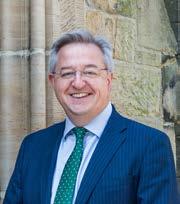
The Sixth Form is an exciting and important stage in your educational career. More than at any other time before, you have the opportunity to pursue the subjects and ideas which interest you the most, personalising your curriculum through the choices that you make.
You will be encouraged to generate your own ideas as you deepen your knowledge, make creative connections between subjects and, importantly, develop your own opinions and views as independent thinkers.
In 2020, we successfully launched a brand-new Sixth Form Curriculum, which provided all our boys with multiple pathways through their A-level studies. We introduced a whole host of new courses, examined and non-examined, designed to give you more choice, to develop academic specialism with
breadth, and to provide what we believe is the best preparation possible for university and future careers.
Our Sixth Form Curriculum has been inspired by the skills identified by The World Economic Forum as having the greatest value in the future, such as complex problem-solving, critical thinking, creativity, leadership, resilience and flexibility. It has also been informed by dialogue with other leading schools in the UK and worldwide. There is more about this topic within the Guide.
I hope you will thoroughly enjoy all the opportunities available to you in the Sixth Form, and I urge you to make the most of these two very special years that lie ahead.
James Priory Headmaster
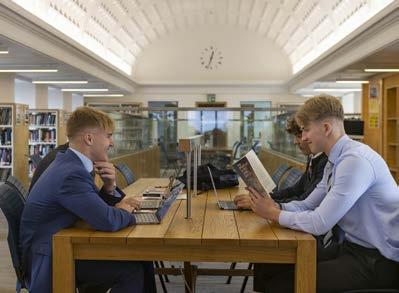
3 Principal Subjects plus Extended Project Qualification and Life Skills
18 periods per cycle in each of the 3 subjects, plus 7 lessons for the EPQ.
Life Skills are available after October Half-Term in the Upper Sixth when the EPQ is completed.
See page 14 for more about the EPQ, and page 22 for more about Life Skills.
3 Principal Subjects plus Additional Language Qualification and Life Skills
18 periods per cycle in each of the 3 subjects, plus 7 lessons for Additional Language Qualification.
Life Skills are available after October Half-Term in the Upper Sixth when the Language Qualification is completed.
See page 18 for more about Additional Language Qualifications, and page 22 for more about Life Skills.
3 Principal Subjects plus AS Mathematics
18 periods per cycle in each of the 3 subjects, plus 7 lessons for AS Mathematics over the full two years.
See page 21 for more about AS Mathematics.
4 Principal Subjects plus an optional Extended Project Qualification
14 periods per cycle for each subject in the Lower Sixth, increasing to 16 periods per cycle in the Upper Sixth.
The EPQ is available for students studying this pathway in the Lower Sixth on 8 periods per cycle.
See page 14 for more about the EPQ.
Four different pathways offer you four different ways to succeed. The pathways are all academically rigorous and you will need to make the choice that suits your individual needs. The pathways allow the flexibility to choose between breadth and specialism.
PATHWAY A
3 Principal Subjects plus EPQ and Life Skills
This pathway reflects the fact that universities usually make offers based on three subjects. It allows boys to specialise in an area of interest through the EPQ. It also offers further enrichment through a programme of non-examined Life Skills courses.
PATHWAY C
3 Principal Subjects plus an Additional Language Qualification and Life Skills
Universities usually make offers based upon studying three subjects. This option allows boys to gain an Additional Language Qualification, which is a valuable transferable skill giving extra breadth to their application. This qualification is recognised by universities and employers and will help in future career choices. It will allow boys to study courses with a language component, such as Economics with French, at university.
B
3 Principal Subjects plus AS Mathematics
This pathway allows boys to study three subjects in depth while gaining an AS Maths qualification. This pathway is likely to suit those studying Humanities or Arts-based subjects who would like to continue studying Maths. Some university courses require Maths to be studied beyond GCSE but do not require a full A-level (do check university requirements). The AS Maths course will have 8 periods per two-week cycle for the full two years, with the AS Maths examination taking place at the end of the Upper Sixth year.
PATHWAY D
4 Principal Subjects plus an optional EPQ
This pathway is most suited to those who want greater breadth to their studies in the Sixth Form or who are able scientists and mathematicians. Those studying Further Maths must choose this pathway, as studying Maths and Further Maths as part of a three-subject profile does not give enough breadth. Boys studying four subjects will do so on 14 periods per cycle in the Lower Sixth and 16 periods per cycle in the Upper Sixth.
The factors that will affect the combinations of subjects to be studied in the Sixth Form are many and varied.
The most important factor is to choose subjects you enjoy and find stimulating. You will perform best at a subject and get the most out of it if you enjoy the work and are fully committed to it.
In the Sixth Form, many students discover their potential in both old and new areas, and they can develop interests that last a lifetime.
How do you find out what a Sixth Form subject is like?
• Read the course description in this booklet
• Ask those taking the subject in the Sixth Form
• Look at an A-level textbook or exam paper
• Speak to your current teachers
Feedback comes via assessments, tests and exams, all of which gives you a general indication of how you would perform at a higher level. If you are thinking of a new
subject you will not have this information, and you will have to make a judgement based on performance in related subject areas.
For advice on which of these might be helpful indications for your potential in a new subject, please speak to the subject Head of Department.
In general, the best combination of subjects is the three or four you most want to study. It can be helpful to think a little about how the working week might look.
Some people will relish having four essay subjects, for example, but this is not necessarily suitable for everyone.
It is also worth thinking twice about taking a single Science subject. The Sciences do support each other, and all involve a certain amount of Maths, and so studying just one Science subject may prove tricky. If you wish to study Physics, for example, then it is highly recommended that you also study Maths (see Page 62).

The Tonbridge Sixth Form is your opportunity to develop as an individual, while studying the subjects you most enjoy. It will be academically challenging but hugely rewarding. The curriculum has been designed to offer you a flexible and personalised educational experience, allowing you to pursue your interests.
There are many enriching and supercurricular opportunities available during these two years. The School will offer encouragement and support as you make the transition to an independent, balanced, thoughtful and capable adult, ready for life beyond Tonbridge.
This is key to Sixth Form studies, and all boys are encouraged to research their subject, extending beyond the curriculum along their own lines of interest. Boys can decide to complete an EPQ, which provides them with the opportunity to study areas of particular personal interest. The EPQ often bridges subjects and disciplines. The EPQ also introduces boys to university-style research and encourages independence, rigour, creativity, problem-solving and public speaking.
Through pupil exchanges, tours or volunteering, boys can find themselves in countries including Australia, China, Mexico, New Zealand, USA, Sri Lanka and India. This is an excellent chance to broaden experience beyond Tonbridge and the UK.
Tonbridge offers boys a wide range of super-curricular opportunities to push their knowledge and understanding well beyond the syllabus. Societies are student-led, helping boys to develop leadership skills and
also to debate, challenge and pursue their interests.
Designed to prepare boys for life after Tonbridge, these include cookery, personal finance, first aid and interview techniques.
Boys in the Sixth Form are provided with many leadership opportunities through a variety of means. For example, the mentoring of younger boys takes place through the House and School Prefect, and Sports Leadership, programmes. There are leadership opportunities, too, for those taking part in the CCF, and in the Duke of Edinburgh award scheme. There is also the Learning Mentor Scheme, where Tonbridge boys acquire vital EQ (Emotional Intelligence) and leadership skills.
Each of the areas listed on this page will help equip you with many of the skills that are essential for succeeding in the modern workplace.
The World Economic Forum has identified a ‘Top Ten’ of vital workplace skills for 2025.
1. Analytical thinking and innovation
2. Active learning and learning strategies
3. Complex problem-solving
4. Critical thinking and analysis
5. Creativity, originality and initiative
6. Leadership and social influence
7. Technology use, monitoring and control
8. Technology design and programming
9. Resilience, stress tolerance and flexibility
10. Reasoning, problem-solving and ideation
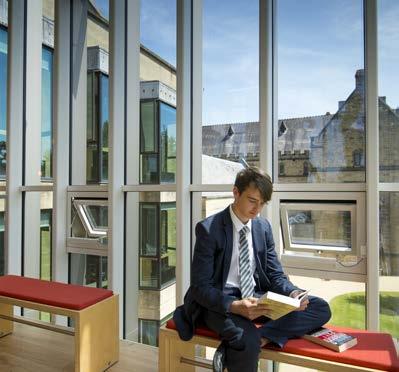
A total of 60 points are needed to gain entry to the Tonbridge Sixth Form.
Example
If a pupil scored two 9s (18 points), five 8s (40 points), two 7s (14 points) and one 6 (6 points), he would have 78 points and would qualify for entry.
Pupils are required to have a miniumum of a 7 in any subject they intend to study at A-level, provided it is offered at GCSE.

The aim when choosing Sixth Form subjects is, firstly, to make sensible, complementary combinations, and secondly, to facilitate as many degree choices as possible. These choices should be based on a judicious combination of ability and interest.
Single Honours degrees in academic subjects usually require that subject to have been taken in the Sixth Form – for instance, History, English and the Pure Sciences. Joint honours often require both. There are some degree courses for which there are specific subject requirements.
Architecture
Usually Physics, Maths and then a design based subject such as Art or DT
Computer Science*
Maths, Further Maths (crucial if aiming for a top university)
Economics*
Maths, Further Maths (crucial if aiming for a top university)
Engineering*
Maths, Physics, and sometimes Further Maths (crucial if aiming for a top university)
Chemistry for Chemical Engineering (often in place of Physics)
Languages
Sometimes more than one language Law*
Any subjects, although an essay based subject is necessary - History, RS or English
Medicine*
Chemistry and Biology plus Maths or a contrasting subject such as RS PPE*
Maths / History / Politics / Economics / Philosophy
Psychology
Biology, Economics, Maths and Further Maths (crucial if aiming for a top university)
Science
Two sciences needed for most degrees
*Admissions Tests required at some universities
The Head of Universities and Careers and other experienced members of staff can offer full advice on sensible combinations of subjects, and detailed requirements can be found on Firefly, UCAS and Unifrog websites. It is worth noting that most roles in the workplace do not require a specific degree course to have been studied, and research shows that more than 80 per cent of graduates do not use the specific content of their degree in their place of work.
Most popular university destinations for Tonbridge boys: 2023-2024
1. Durham
2. Exeter
3. Bristol
4. Oxford
5. Cambridge
6. UCL
Most popular subjects read at university by Tonbridge boys: 2023-2024
1. Theology/Philosophy*
2. Economics/Business/Finance
3. Science related subjects*
4. History*
5. Engineering*
* Includes single and joint honours
The School’s Head of Universities and Careers is assisted by other members of staff, including a full time Careers Advisor, who have specialist knowledge of particular careers, universities and subjects. One-to-one appointments are offered with the Head of Universities and Careers for boys and parents throughout the Sixth Form.
The boys also receive considerable guidance from their Housemasters, who build up extensive experience and play a major part in shaping and directing boys’ ideas about their futures.
The Universities and Careers Department is located on the ground floor of the Smythe Library, where a full set of university prospectuses and a wide selection of literature on careers and related topics, can be found.
The Universities and Careers Guide can be found on our Portal: this has pages dedicated to Oxbridge, US and other overseas universities, as well as information about degree apprenticeships, gap years and a step-by-step guide to the complete university application process.
The department also publishes a termly bulletin, containing a variety of helpful materials, ranging from news articles and information about universities and careers, to opportunities for extension activities. There is also a ‘spotlight’ section each term which provides a ‘deep dive’ into some of the more complex nuances of university applications. In the Lower Sixth there are three main
university events for boys and parents, in addition to the regular careers evenings in the Michaelmas and Lent Terms.
For those who are considering an application to Oxford or Cambridge there is a plenary session where broad themes are addressed, followed by more specialist talks by academics from both universities.
The event focuses on applications to all UK institutions, during which the Headmaster James Priory and the Head of Universities and Careers, Ruth Davis, provide brief introductions, before further information is presented by an invited Director of Admissions at a leading university. Attendees will also hear from The University Guys advisor David Hawkins.There is also a Universities Fair on the same evening, which gives boys and parents an opportunity to meet representatives from many leading universities from the Russell Group and other higher tariff providers.
Bringing together speakers with specialisms in the US, Europe, Canada and other countries, this event gives the boys an introduction to the global university landscape. For those who decide to make an application to a US university, there is a full programme of preparation and advice. Training and mock testing are also offered for SATs and ACTs (the American universities admissions tests) and boys are supported by members of staff with specialist knowledge of the US system.

During the Lent Term of the Lower Sixth, the boys are introduced, through a series of seminars and talks, to the detail of the university application process. There are also regular seminars given from a variety of UK and international universities.
Everyone is also given access to Unifrog, a powerful research tool, to help inform their decisions and aid with preparing strong and successful applications.
There is an annual Careers Mentoring Evening, where around 70 mentors from different sectors gather to share their experiences and give advice to the boys about their profession, in a relaxed and informal environment.
At the end of the Summer Term of the Lower Sixth, there is an extensive programme covering personal statement writing, gap years and how to make a success of university life.
As the boys move into the Upper Sixth they
are given comprehensive guidance through the application process, from filling in the UCAS form, completing Admissions Tests and using the Common App for US applications through to accepting offers.
Each Academic Department offers rigorous admissions test preparation classes and academic interview training. To supplement this, there is also provision for additional (and more general if required) interview training by an outside agency. These are useful for all high-tariff universities and are not limited to Oxbridge applicants.
Advice is given again on the transition to university, and full support is offered on results day to deal with any queries that may arise.
Sixth Form boys are encouraged to spend time completing work experience, which plays an increasingly important part in university admissions and future employment. The School can assist in helping finding placements through the mentoring scheme.
Course (and Board): Level 3
Extended Project Qualification (AQA)
What is the EPQ?
The Extended Project Qualification (EPQ) is an independent research project that serves as an opportunity for boys to demonstrate their intellectual curiosity, providing the freedom to do a piece of work on a subject area of their choosing, not restricted by the limitations of an exact specification or their A-level subjects.
These projects can cross the traditional boundaries of the taught subjects or be linked to a particular course at university that might not be covered within the School Curriculum. It is an opportunity for the learner to take ownership of their work.
The project can take on one of the following formats, depending on the area of study:
• An artefact (an individualised project linked to the learner’s skill set and interests). For example, the production of a CD of music, devised and recorded by the pupil; a piece of literature such as a novelette or a poem; or a piece of engineering (for example, the design and production of a go-kart or solar-powered drone).
• A dissertation.
• An investigation (such as a scientific study or experiment).
What are the benefits of an EPQ?
In addition to developing a raft of transferable skills that will make students better undergraduates, a successful EPQ will earn candidates UCAS points, which will contribute to their university applications. An A* grade in the EPQ counts as half an A-level, worth 28 UCAS points (which is more than an AS Level qualification).
Will the EPQ enhance my UCAS application?
The skills EPQ develops – planning, research, self-motivation, decision-making, problemsolving and independent thought – are exactly the sort of qualities an admissions tutor is looking for.
Many of the top universities guarantee to give a lower offer to students who have completed the EPQ. These universities include Bath, Exeter, Birmingham, Bristol, Cardiff, Lancaster, Leeds, Newcastle, Southampton and York. Both Oxford and Cambridge are clear that they value the EPQ and, although they do not make reduced offers, they believe that it enhances applications and makes the student more appealing to them. UCL, Edinburgh and LSE also state something similar on their websites.
The EPQ encourages boys to develop academic and organisational skills that will help them to approach tasks in their other A-level subjects. This same skill set for independent learning will also support their learning beyond Tonbridge, which is why this qualification is so valued by universities.
“We welcome the introduction of the Extended Project and would encourage you to undertake one, as it will help you develop independent study and research skills and ease the transition from school/college to higher education.”
- University of Cambridge
“We welcome the use of the Extended Project as a means of stretching the most able students and encouraging an interdisciplinary approach.”
- University of Edinburgh
“We recognise that the EPQ will provide an applicant with the opportunity to develop research and academic skills which are highly relevant for study at Oxford.”
- University of Oxford
What skills does an EPQ help develop?
The EPQ supports independent learning, helping to develop decision-making skills, problem-solving skills, research skills, project management and time management skills, initiative and enterprise.
The process of completing the project also encourages boys to extend their analytical synthesis, writing, evaluation (reflecting on both the project and their own contributions) and presentation skills. Depending on the precise nature of the EPQ, boys can also develop their investigative, field study performance or production skills as appropriate.
All of these learning experiences will contribute to laying down excellent foundations that boys can use to support their aspirations for higher education and career development.
Timeline
Research can start over the summer before students embark on their studies in the Sixth Form allowing students to get ahead. The course involves a taught course involving 30 hours of seminars and tutorials to help the students develop the skills they will require to complete their projects successfully.
The majority of this material is delivered during the Michaelmas Term. Draft reports are submitted at half term in the Lent Term, allowing feedback to be given before final adjustments are made during the Easter break. Formal presentations, that feature as part of the assessment are given at the beginning of the Summer Term, with the completed projects being submitted before half term.
The qualification is therefore completed within the Lower Sixth. The advantage of this timescale is that the boys will have their provisional EPQ mark in time for their UCAS applications, and have more time over the summer to consolidate their other subjects.
Furthermore, this timescale has been designed to avoid conflict with Progress Tests and the UCAS exams that are used to determine the UCAS grades in the student’s other A Level options.
The results will be submitted to the exam board for external moderation in November (with certification in January) of the Upper Sixth year, allowing all pupils to then focus on their final exam preparation in their other subjects.
The EPQ is internally assessed and externally moderated. Assessment is based on the pupil’s demonstration of the skills they have developed and their reflection of the process, as well as the quality of their independent research project.
The assessment is broken down into four sections.
Boys are required to maintain an activity log to record their progress and the development of the project.
All projects will need to be written in an academic style, giving evidence that sources can be evaluated and cited in a recognised format, such as the Harvard referencing system.
All projects will require a written element, although the length of the report will be determined by the style of the project selected, which reflects the time that boys need to invest in the different elements of their respective projects (90 hours). A dissertation will typically be 5,000 words in length. An investigation requires the collecting of primary research, the analysis of which is discussed in a 4,000-5,000 word report. An artefact will involve the production of the artefact, as well as a written account of the process, in a minimum of 1,000 words. Images of the artefact will also be submitted for moderation.
Regular reflection and an evaluation of the strengths and weaknesses of the project contribute to the assessment criteria. The projects will also involve an oral presentation, which contributes to the evaluation and grading of the project.

(AO4) Worth 20% of the final mark. Evaluation and presentation: your reflection on the project process and communication of the project to others
The best project titles pose a question which can be explored through the research element of the project. These titles should avoid having a simple yes or no answer and involve a degree of debate and analysis reflecting on the conflicting opinions. As long as an idea is ethical and realistic, we will try and facilitate the project – empowering the students to take responsibility for their own learning.
Some examples of EPQ titles include, but are not limited to:
• Is there a generational difference in attitudes and actions towards climate change?
• Is it worth spending so much on the war against terror?
• How far were the witch trials in the 1600s in Britain based upon misogyny?
• Is stem cell research ethically justified?
• Do violent computer games contribute to anti-social behaviour?
• Should human cloning be allowed?
• Did life evolve or was it created?
• What are the most important factors that affect the quality of life among elderly residents in long-term care and how can we improve the quality of life for future residents?
• To what extent should religion and science be in conflict?
• What reasons could there be for ChargeParity violation?
• Is it ethical to cull badgers to control TB?
• Empathetic movement: does physical theatre impact emotional intelligence in adolescents?
• Why is the South Asian population more susceptible to type 2 diabetes?
French Course: Course (and Board): DELF (B1) German: Goethe-Zertifikat (B1)
Spanish: DELE (A2-B1 escolar) Mandarin: HSK (B1)
What is the subject about at Sixth Form level?
We believe that learning a foreign language has never been more important, for the diverse and valuable skill set that it develops, the cultural awareness and sensitivity that it promotes, and the sheer enjoyment that it offers. Following this new and exciting course is an ideal way to keep language skills going beyond IGCSE and obtain a valuable, lifelong qualification in the process.
Who is this course for, and what are the benefits?
This course is for those who:
• Enjoy studying languages and would like to keep improving these skills, but do not want to take a full A-level in a modern language.
• Would have liked to continue with a modern language at A-level, but have too many options to choose from.
• Would have liked to continue with a modern language at A-level, but find their option blocks are already occupied by subjects they need to study for a university application.
• Want an extra ‘string to their bow’ in the form of an official, lifelong qualification that evidences a valuable set of transferable skills.
• Want to gain an official, lifelong qualification that might give options to study or work abroad one day.
These qualifications:
• Are Pass/Fail official qualifications, which are valid indefinitely.
• Allow access to courses with language combinations in UK universities (e.g. Law with German, Business with French), and to courses in university language centres.
• Can be referenced on UCAS forms and on CVs. They are highly valued by universities and employers alike.
• Are increasingly in demand by universities and for employment in other countries.
• Make it easier for students to work in other countries and obtain grants.
• Are the official examinations of the French/ German/Spanish/Chinese governments, and so represent the ‘gold standard’ for international language qualifications.
Why study it? What skills does it help develop?
Studying a modern language is primarily a highly interesting and hugely rewarding experience. Sitting an Additional Language Qualification continues the process of linguistic development through the study of themes firmly rooted in the culture and society of the country or countries where the language is spoken. Boys will come to converse naturally, to write accurately and creatively, and use authentic cultural artefacts such as magazines, newspapers and documentaries to develop their understanding of, and form opinions on, key debates and issues.
What level of prior knowledge and skills is required?
• Are recognised by organisations, companies, chambers of commerce and public and private educational organisations in the UK and all around the world.
The successful study of an Additional
Language Qualification is very much within the ability range of most who achieve a 7 or above at IGCSE. However, we are very happy to advise on a case-by-case basis: come and talk to us!
The DELF/Goethe-Zertifikat/DELE/HSK exams assess the four key skills: speaking, listening, reading and writing. Texts and prompts are always authentic materials in the target language. As is the case at IGCSE, emphasis is placed on understanding, interpreting and manipulating key information, and producing accurate language that displays good knowledge and a range of grammar and idiom.
Exams are towards the end of the Michaelmas Term in the Upper Sixth, so freeing up valuable time in the final run-up to A-levels. Boys will follow the same pattern of progress tests and mock examinations as for A-level subjects, and will sit a mock exam in the Michaelmas Term.
Why study a modern language?
Boys have in recent years successfully combined a language with sciences and mathematics, as well as with more traditionally compatible subjects such as English, history or economics. Certainly, there are distinctly logical and analytical elements to the course, as well as creative and interpretative outlets, which gives this subject a unique feel. The reality is that languages are a ‘facilitating subject’ and so enhance any portfolio.
Many medicine courses, for example, are particularly keen on the study of a modern language post-IGCSE, as it shows an ability to communicate, and understand and be
sympathetic to other viewpoints and perspectives. The same is true of lawyers looking to sway a court room, engineers embarking on projects abroad, or humanitarian workers as they seek to break down cultural or social barriers. Many university courses and careers actively encourage knowledge of a foreign language, and there are a growing number of opportunities to spend time abroad on a placement while studying another subject.
What opportunities exist beyond the classroom?
Boys will be able to take full advantage of the variety of extra-curricular activities that take place within the Modern Languages Department.
We organise a number of trips, and we can also advise on, and help to arrange, individual study or work placements. Visits to the theatre or to art galleries and exhibitions are also frequently arranged, as are film nights here at school.
The student-led Modern Languages Society invites and hosts guest speakers and organises events, including seminars, reading groups and careers evenings.
There is a well-established extension programme in place to stretch and challenge our most able students, with both faculty-wide and language-specific seminars.
This is offered for those doing three subjects who, for a variety of reasons, want to continue with some Maths in their Sixth Form programme, without taking the full A-level. This will usually be because it is advantageous for their likely future degree course or future career.
This is still a challenging course, although not as challenging as the full Maths A-level. Those achieving a Grade 8 at GCSE should have a good chance of reaching a high grade in this course.
As with all the Sixth Form Maths courses at Tonbridge School, we will use the OCR Maths A-level B (MEI).
The course will cover Pure (or Core) Maths where the ideas of algebra, geometry and calculus are taken further than at GCSE.
There is also material from the two main strands of Applied Maths; Mechanics and Statistics. Mechanics involves the study of motion and forces, while Statistics extends the GCSE ideas of probability and analysing data. The exam consists of two papers, each of one and half hours, one with Pure and Mechanics and the other Pure and Statistics.
The ability to be able to do Maths beyond GCSE, and its corresponding skills such as problem-solving, logical thinking and modelling, are much appreciated in the world of work.
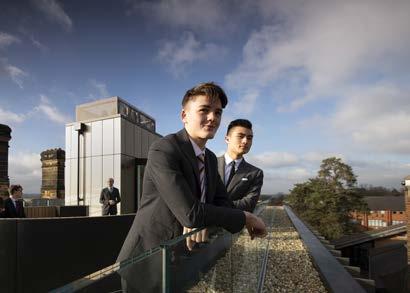
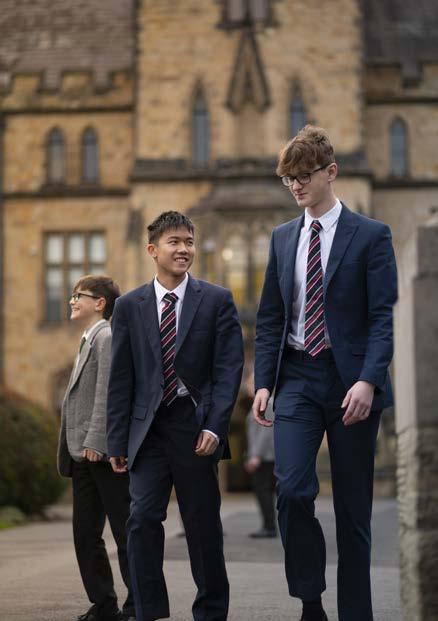
The Life Skills course is designed to prepare boys for life after Tonbridge. The course will teach basic cooking, first aid and how to keep yourself safe, which we hope will be useful at university and beyond.
An Introduction to Finance will allow boys to make informed decisions about loans and credit cards, and will help with major life choices such as which is the best mortgage and how to buy a car.
Interview Techniques will, hopefully, help boys land their first job. This will cover, for example, how to write a good CV, psychometric testing, research before a first interview and what questions to ask.
The Global Perspectives course looks at major world issues, ensuring that Tonbridge boys have an informed view.
Cookery with Mr Huxley (Head of Digital Creativity)
This course shows boys how to cook from a recipe, using a range of techniques.
The course will ensure that all boys have hands-on experiences with food and gain
confidence in basic food hygiene and preparation skills, while finding out about healthier eating through practical food work.
Recipes may include:
• Tomato, Bean and Pasta Soup
• Spaghetti Bolognaise
• Chicken Fajitas
• Thai Beef Noodle Salad
• Poached Pears
Ingredients will be purchased in advance, with vegetarian alternatives.
Global Perspectives with Mrs McNeil (Lower Master)
Boys will research, analyse and debate a number of issues in the world today, with boys taking the roles of different groups to explore and produce a blog post.
Issues covered may include:
• Taiwan’s place as a sovereign state
• Equality of access to COVID vaccinations
• South Africa’s right to water
Over the cycle, boys will gain insights into how perspectives and conclusions have influenced their own views, attitudes and personal learning.

Public Speaking and Interview Techniques with Mrs Davis (Head of Universities & Careers) and Mrs King (specialist Careers Advisor)
This course is designed to help boys get their first job, with tips on:
• How to write a CV
• Key research into the job
• Marketing yourself in person and online
• Public speaking
• Interview techniques
• Mock interviews
Finance with Mr Sixsmith (Economics Teacher)
The Finance course will cover the following topics:
• Banking; What do banks do? What is the structure of the banking industry? How to make money work for you
• Credit cards and credit ratings, current accounts, saving accounts, direct debits, ISAs and shares
• Student finance – what you will need to spend it on and what you need to pay back
• Payslips and taxes – what will be the bottom-line figure of income?
• Financing a car purchase
• Buying/renting and the cost of housing
• Pensions
• Distribution of income and wealth
This year we are offering a yoga course. Yoga is essentially a spiritual discipline based on an extremely subtle science, which focuses on bringing harmony between mind and body: an art and science of healthy living.
Yoga noticeably improves the sleep of those who participate. It also increases flexibility and blood circulation to the joints and is designed to stretch the muscles and connective tissues. Breathing techniques and meditation will enable practitioners to relax their minds as well as their bodies.
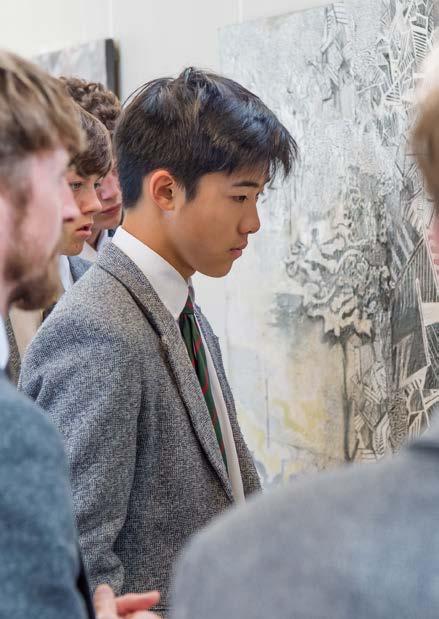
Course (and Board): A-level: Fine Art (OCR H601)
What is the subject about at Sixth Form level?
The Art Department at Tonbridge offers a vibrant, inspiring, and nurturing environment for Sixth Form students studying A-level Art. Students develop creative autonomy and gain the skills to express complex ideas, with an emphasis on collaborative learning and hands-on experience. This enriching approach fosters confidence, independence, and a strong sense of ownership over their work.
From the outset, students learn to bring emotional and philosophical ideas to life, gaining a foundation in essential creative and technical skills that will empower them to tackle the advanced demands of A-level Art. Divergent thinking is central to this course, giving students an advantage in future careers, where innovative problem-solving and creative agility are invaluable.
The first term, known as the ‘Foundation’, introduces students to a series of focused blocks where they explore specific media. Life drawing is mandatory in the Michaelmas Term, honing direct observation skills, while students also gain access to top-tier facilities for photography, printmaking, sculpture, and ceramics. This foundation stage lays the groundwork for students to pursue their personal creative directions and develop unique, independent portfolios. The only ‘house style’ in the department is one of originality and innovation.
Students are also guided in developing critical skills through presentations, reviews, and short essays, supported by an extensive Art Library. In addition to regular gallery trips across London and throughout Europe, the boys are delivered talks from practising artists, to further deepen the boys understanding. Opportunities to exhibit in prestigious spaces like the Tunnel and Old Big School galleries culminate in a summer exhibition where students present their work to the wider School community, families, and guests.
Why study it and what skills does it develop?
A-level Art sharpens creative thinking and complements a broad range of subjects across the arts and sciences by developing innovative, “outside-the-box” problem-solving skills—essential for both personal and professional success. Through creative practice, students build empathy, aesthetic appreciation, and expressive communication, while honing critical cognitive skills like divergent thinking. Art nurtures emotional intelligence and metacognitive awareness, fostering a reflective approach to learning. By enhancing design sensibilities, visual-spatial reasoning, and symbolic thinking, Art encourages resilience and creative risk-taking, equipping students with perceptive and holistic thinking skills valued across a broad range of careers, particularly in leadership roles.
What level of prior knowledge and skills are required?
A-level Art builds on GCSE skills, though students without prior GCSE experience can still join with support and guidance. Assessment is continuous, with no formal written exam.
There are 2 components
Component 1: Personal Investigation (60%): Practical work with a related written study.
Component 2: Externally Set Task (40%): Practical response to a given stimulus with a timed outcome.
With what other subjects does Art combine well?
Art combines well with almost any other subject, including Humanities, Sciences, and Maths, and suits many different types of students. These include boys who may wish to pursue a creative career, such as architecture, as well as academically focussed students who see it as complementary to their other subjects and an opportunity to develop a broader range of cognitive skills.
What do boys currently taking Art say about it?
• Stimulates the creative side of our brain during a heavily academic timetable.
• Provides opportunities for self-expression, bringing the inner world into the outer world of concrete reality.
Exercises and develops higher-order thinking skills, including analysis, synthesis, evaluation, and helps me to pre-empt problems.
• Improves academic achievement –enhancing my test marks and, in general, attitudes, social skills, critical and creative thinking.
• A nice break from essay subjects.
• Art skills develop both independence and collaboration.

What can studying Art lead to at university and beyond?
Art develops transferable skills that are highly valued by top universities across a range of disciplines. A typical cohort of boys taking Art A-level includes Scientists, Medics, Economists, Writers, and Philosophers, as well as those building portfolios for Architecture, Fine Art, or Graphic Design courses.
In a rapidly changing world where AI will increasingly transform the workplace, skills in creativity, divergent thinking, and problem-solving are more valuable than ever. Studying Art at A-level not only prepares students for creative fields but also equips them with perceptive and analytical skills, giving them a distinct edge in any professional path.
Course (and Board): A-level (OCR H422)
What is the subject about at Sixth Form level?
Biology is the study of the living world. One of the fastest changing and growing areas in science, biology has been transformed since the 1960s by the advent of new methods of studying organisms. From the molecular level right up to entire ecosystems, the study of biology has never been more relevant, exciting or important - doubtless the reason why it is one of the top three A-level choices nationally, every year.
The A-level course starts off in the Lower Sixth by building solid foundations in biochemistry and human physiology. One teacher takes responsibility for the early dive into the molecular structures of carbohydrates, fats, proteins and nucleic acids (DNA and RNA) and then build these into a functional understanding of cells. We look at cellular processes such as protein trafficking and cell division, leading to an understanding of the molecular basis of cancer.
Whilst at the same time, with their second teacher boys study the lungs and circulatory systems of animals and transport systems in plants. They look into electrical coordination of the heart and exercise physiology, progressing to the study of epidemiology, immunity and infectious disease. The Upper Sixth course builds on these foundations whilst maintaining variety in experience, with one teacher focussing on biochemistry, coordination and control in both animals and plants whilst the other introduces classical and modern genetics, gene technology, natural selection, evolution biodiversity and conservation.
There is ample opportunity for practical work throughout the course, with an emphasis on developing independent investigative skills using our exceptionally well equipped laboratories. Facilities include university quality microscopes and modern research tools such as a PCR machine and facilities for DNA analysis. A long running and successful collaboration with the Natural History Museum has also enabled access to scanning electron microscopes, both at Tonbridge and at the Museum, over the last few years.
Many boys choose to extend their practical work to take on their own investigations at the popular Monday evening Biology Club, and to present their results at the School’s International Science Conference held each year in March. Recent projects have included investigations of invasive crayfish using eDNA, searches for new antimicrobial compounds, a survey of local moths, hunting for tardigrades, coral reef fish surveys and whether ants get hooked on caffeine.
Why study it and what skills does it develop?
Biology is a fascinating and complex subject, which helps develop a wide range of cognitive skills. It requires careful observation, experimental skills, precision in use of language and the ability to understand the interaction of processes operating on spatial scales from the molecular to whole ecosytems. Biology provides the background needed to understand global challenges and ethical dilemmas. It opens up opportunities in a huge range of life sciences careers from
biotechnology to medicine or, as a highly respected, difficult, numerate A-level, will enhance any academic portfolio.
The practical elements of the course will develop boys’ fine motor skills as well as their ability to work as part of a team.
What level of prior knowledge and skills is required?
Sixth Form Biology builds on the knowledge and skills developed during the IGCSE course. It is strongly recommended that anyone wanting to achieve the top grades at A-level has an interest and aptitude in the topics covered at IGCSE Level.
A wide variety of skills will help boys be successful. They need to be comfortable with IGCSE Chemistry and Maths and willing to apply these, but higher-level knowledge will be taught if required. A good memory for terminology is helpful, and the ability to write clearly and succinctly. As with many other subjects, boys are likely to find Biology more challenging at Sixth Form if they are unlikely to achieve at least Grade 7 at IGCSE. Double award students may find the course challenging unless they are doing particularly well in the Biology and Chemistry sections of the Double Award specifications.
What type of assessment is used?
The course is assessed through a combination of multiple-choice questions, short structured questions and a practical exam that will require competence in simple investigative skills and the use of a microscope. There are no long essays in the exams but boys can expect to write at least some of these as prep assignments, as well as posters and presentations that will develop different aspects of their scientific communication skills.
With what other subjects does Biology combine well?
Biology fits with a wide variety of other subjects, which is not surprising given the way the subject can switch between the study of the very small and the very large. Biology will complement the other Sciences, particularly Chemistry, but Geography also combines especially well. Biology is an excellent ‘stand alone’ science too, and a popular choice with boys looking for something different alongside an arts or humanities programme.
What can studying Biology lead to at university and beyond?
The study of Biology at Sixth Form level will clearly help boys who wish to study it, or its many derivatives (Genetics, Biotechnology, Marine Biology, Environmental Science, Physiological Sciences) at university.
Biology is strongly recommended for candidates who wish to study Medicine, Dentistry or Veterinary Science.
Universities recognise the academic rigour involved in the study of the subject, and Biology can be seen as an excellent foil in applications to a number of courses.
Many of the major issues faced by the world today have a biological element to their possible solutions, and as such the study of Biology is likely to remain valued by employers well into the future.
Course (and Board): A-level (Edexcel)
What is the subject about at Sixth Form level?
All Tonbridgians will go on to be part of, or interact with, organisations. This is a subject that explores how such organisations function: how they choose objectives; how they use marketing and guide operations to ensure that objectives are achieved; how they find the right people and get the best out of them; how they use financial accounts to review performance and help with decisionmaking; and how they deal with a changing environment, locally, nationally and globally. Ultimately, it is about how they develop, enact, monitor and adapt a strategy that will (hopefully) succeed.
Why study it and what skills does it help develop?
A-level Business is current and highly relevant to the world outside the classroom. It is a course from which all lively, independentlyminded boys will benefit. It focuses strongly on problem-solving and on establishing a chain of reasoning to justify a conclusion based on clearly understood theory and models, and not just common sense. The subject suits the sort of boy who has strong viewpoints and likes to argue and justify their opinions. It is not a subject of ‘right answers’ but one of making considered decisions and forming justifiable judgements.
What level of prior knowledge and skills is required?
As Business is a subject only available in the Sixth Form, there is no expectation that boys have any prior knowledge. In terms of skills, the main form of assessment is extended
writing, and therefore boys considering Business must be able to build wellstructured and balanced academic essays.
As an important aspect of successfully running a business is the ability to review and interpret figures, boys selecting Business as an academic subject should also be comfortable working with numbers (note the emphasis is not on number-crunching as such, but rather upon the interpretation and application of the numbers).
What type of assessment is used?
Assessment is purely based on the end-ofcourse examinations. These are made up of staggered questions of increasing challenge, based on a set of stimulus material taken from the business world. There is no coursework.
With what other subjects does Business combine well?
In terms of skills, given the importance of coherent and convincing argument, Business sits very comfortably in a Humanities portfolio. Boys who have studied it in the past have mixed it with a range of subjects. A language, in particular, can offer an attractive fit because of the degrees that offer sandwich courses, during which the student undertakes a year working abroad in industry and thus develops a better understanding of both subjects.
Economics utilises many overlapping ideas, so boys in the past have enjoyed being able to reinforce their understanding across the two subjects whilst pushing in different directions.

Studying both is absolutely fine as part of a four-subject combination.
If you drop to three subjects, however, and wish to apply for a highly competitive course at a selective university, then you may be asked for a slightly higher offer if two of your three subjects are Business and Economics: such universities prefer to see two contrasting subjects in addition to Business or Economics.
If you are uncertain about this, seek further advice from the Head of Universities & Careers.
What activities operate outside of the classroom?
Trips recently organised by the Department include those to Hong Kong, Beijing and Shanghai, as well as visits to local businesses such as COOK. Beyond this, the Social Science Faculty has its own society, Isos, which organises speakers from the worlds of business, economics and politics, to which you will be invited.
What can studying Business lead to at university and beyond?
In an economic environment that is dynamic, with rapid changes in labour markets, decision-making and entrepreneurial skills are increasingly important.
Business is obviously a subject that will provide a good level of relevant awareness for anyone who thinks they may set up and run their own enterprise in the future. It is also likely to prove particularly advantageous to those planning a career in law, accountancy, industry or commerce. It is recognised by all universities and the provision of business-related degree courses is wide.
Any boy considering such a course would obviously gain from an academic grounding in the subject, although there is no expectation from Higher Education providers that you do so.
Course (and Board): A-level (AQA 7405)
What is the subject about at Sixth Form level?
Chemistry aims to explain the material world around us. For centuries, man has sought to produce useful substances from raw materials: from crude metals developed in the Bronze and Iron Ages to ultra-modern innovative materials such as graphene, sophisticated pharmaceuticals and high explosives.
Chemistry is divided into three main disciplines, although there is huge overlap between these areas. Physical Chemistry looks at the way that the structure of atoms and molecules controls their properties. It investigates what makes some reactions very fast, while others are slow. It looks at the energy and entropy changes that accompany chemical reactions and how atoms and molecules are bonded together.
Inorganic Chemistry studies the patterns and trends in the Periodic Table. This is done in more detail than at IGCSE and the emphasis is always on understanding the scientific concepts underpinning the observed chemical trends.
Organic Chemistry considers the uniqueness of carbon and the vast range of compounds it can form. Starting with simple molecules, the types of reactions undergone by organic molecules are studied.
The mechanisms of these reactions are discussed, as are analytical and spectroscopic techniques for elucidating structure.
Chemistry is a practical subject and participants will spend a significant amount of time learning through practical work in the laboratories.
Why study it and what skills does it help develop?
Studying Chemistry at this level provides answers to many intriguing questions about the world around us and how humans can influence it for good or bad. It provides a solid training in the Scientific Method and significantly enhances analytical thinking skills.
It helps to develop team-working, as much of the practical work, which also develops fine motor skills, is done in small groups. It develops a precision in use of language, particularly when explaining phenomena, and it encourages enquiring minds. Above all, it is intellectually challenging and stimulating.
What level of prior knowledge and skills is required?
Sixth Form Chemistry builds on and enhances the knowledge and skills developed during the IGCSE course and it is important that anyone contemplating this subject has a profound interest in, and understanding of, the IGCSE course. In addition to competence with algebra and using mathematics to help solve problems, the ability to visualise and manipulate 3-dimensional objects in the mind is important.
There is a fair amount of factual material to learn and so a well-ordered memory helps. Boys will find Sixth Form Chemistry tough if they are not likely to be able to achieve at
least a high Grade 7 in IGCSE Chemistry or 7 / 8 in IGCSE Double Award Science (with 80% or better in the Chemistry component).
What type of assessment is used?
Chemistry is typically tested via structured, short-answer questions, some of which require problem-solving or graph-drawing skills. Rarely does any one part of a question attract more than 5 marks.
While there are no essays in Sixth Form Chemistry, the ability to express oneself accurately, concisely and precisely is essential for questions that require explanation of a phenomenon.
There is no coursework, as such, but practical laboratory work forms an important part of the course and will be assessed.
With what other subjects does Chemistry combine well?
The study of Chemistry works best if taken alongside Mathematics plus one or both of Physics or Biology.
If it is possible that you might take Chemistry or a Chemistry-related course at university then those subjects become essential. Chemistry can be rather “lonely” as part of a combination involving Arts subjects only.
Having said that, exceptional candidates who wish to keep a science going for reasons of breadth in their Sixth Form studies, where the other subjects are purely Arts subjects, have done well in the past.
What do boys currently taking Chemistry say about it?
‘Chemistry is one of the most interactive subjects Tonbridge has to offer.’
‘A lot of revision resources are provided.’ ‘The course is extremely useful, and content is fun to learn. The teaching is top quality.’
‘Chemistry provides a great depth of understanding of how it governs our society today.’
What can studying Chemistry lead to at university and beyond?
In addition to pure Chemistry or Chemistry-related degree courses, Sixth Form Chemistry is essential for medical, dentistry, veterinary and related courses. It is also essential for chemical engineering and useful for other branches of engineering.
Chemistry is a highly regarded subject with a very useful and widely applicable skill set, attractive to employers, and it opens doors to a wide range of careers, not necessarily directly related to Science.

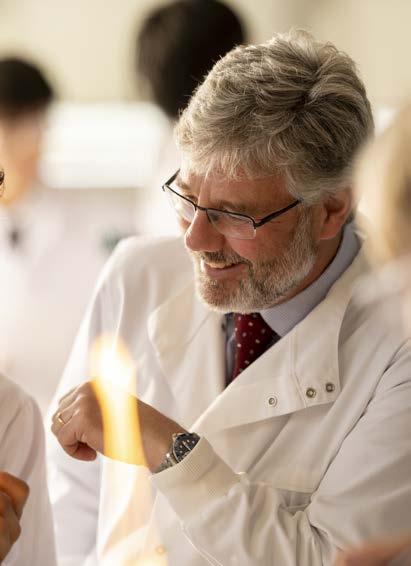
Latin Course (and Board): A-level (OCR H443)
Greek Course (and Board): A-level (OCR H444)
What is the subject about at Sixth Form level?
Those choosing to study Latin or Greek (or both subjects) at A-level have the opportunity to explore one or two of the richest and most influential cultures in the history of the world through the means of their languages and literature. In each course, emphasis is initially placed upon the acquisition of high-level language skills which will equip boys to read works of Latin or Greek literature in their original form.
Once this linguistic foundation is in place, we proceed to study a selection of some of the greatest literature ever written: typically, this will include some epic poetry, some drama, some oratory and some historiography. This work requires boys to develop some understanding of the historical context in which such literature was created: so A-level Latin and Greek also serve as an introduction to some central periods of ancient history.
What level of prior knowledge and skills is required?
One of the pleasures of studying the classical languages is the stimulating intellectual challenge that each presents to all boys, including the most gifted. In order to meet this challenge, boys will need a strong record at GCSE: a 9 or an 8 in the classical language(s) chosen, and preferably similar grades in English Language and Literature. However, Latin and Greek should not be seen as choices only for brilliant linguists; high
grades are attainable by any boy who has done well at GCSE, is interested, and is prepared to work.
The study of Latin and Greek is demanding, but also highly rewarding. The most obvious rewards to be gained are advanced training in two languages of great interest and appeal, and in-depth familiarity with some wonderful, life-enhancing literature. But these subjects have always been prized as also offering the chance to acquire a range of transferable skills.
Those who have studied Latin or Greek to a high level often find learning new languages (European and non-European) significantly easier in adult life. Their written English is often more precise, clear and cultured as a direct result of their contact with the classical languages. Skills in problem-solving, in the construction of arguments, and especially in the micro-analysis of written texts are all developed to a high degree by these subjects.
Boys are also trained in the close reading and practical criticism of literary works, which equips them to read with greater understanding and enjoyment later in life. Moreover, they acquire a familiarity with literatures and cultures which are not only of great interest in themselves, but which have formed the foundations of later traditions in Europe and beyond: awareness of the Classics is of great use when trying to understand later developments in literature, culture and history.
With which other subjects do Latin and/or Greek combine well?
Latin and Greek are especially rewarding to study side by side at A-level; either language can also profitably be studied on its own, and in combination with other subjects.
The classical languages are natural complements to modern languages, English Literature, History and Religious Studies. But they may also appeal to students of other subjects who are looking to maintain a wide perspective and who enjoy an intellectual challenge; Latin, Greek, Maths and Further Maths, for example, is a combination which has traditionally attracted some of the most able candidates at A-level.
What activities take place beyond the classroom?
All students taking Latin or Greek will be invited to take part in trips to the classical lands during their Sixth Form course (although these trips are not compulsory); we alternate between Greece one year and another classical land the next. Visits to plays, talks and exhibitions in the UK also serve to broaden students’ knowledge of the subjects.
What type of assessment is used?
Both Latin and Greek are assessed entirely by examination at A-level. The examinations are sat at the end of the Upper Sixth year. There are two language papers (testing the ability to translate and comprehend unseen passages), and two literature papers (testing knowledge of set texts in prose and verse). Language accounts for 50% of the total mark, and literature for the other 50%.
What can studying Latin and/or Greek lead to at university and beyond?
Latin and Greek are traditionally two of the subjects most highly regarded by universities and employers. They are good training not only for a Classics degree (the top universities will generally expect students to have taken Latin A-level, and Greek will be a great asset), but also for Modern Languages, English Literature, Theology, History, PPE and Law, among others.
The range of transferable skills acquired during a Classics degree is even greater than that at A-level, and Classics graduates are valued for their flexibility as well as for their intellectual rigour, their attention to detail and their sense of historical perspective.
Many go on to enjoy successful careers in law, the civil service, banking and academia – and indeed in less traditional professions.
Course (and Board): A-level (AQA 7517)
What is the subject about at Sixth Form level?
“Computer Science is no more about computers than astronomy is about telescopes.”
The A-level is approximately 40% programming and 40% theory, with a project component worth 20% of the final grade.
The programming component covers all of the standard content of an introductory programming course, but quickly moves on to advanced data structures, including stacks, queues, hash tables, graphs and trees, along with associated searching, sorting and optimisation algorithms. Vector geometry, which underpins many of the techniques behind modern computer games, is also introduced.
The theory component covers the big topics in computing, such as operating systems, databases, computer architecture and networking, but also includes some fundamental areas of theoretical computer science, including set theory, number representation, encryption and regular languages.
The project requires students to carry out a practical investigation into some aspect of computing. Obvious choices for the project could be the development of an app, game or database-driven website, but the specification is broad and opportunities to investigate other areas, such as music composition, computer
vision and imagery, machine learning, and scientific modelling and simulation, are available.
Why study it and what skills does it help develop?
“Computer science is an abstract form of engineering.”
It goes without saying that computer science, especially programming, skills are highly sought after in the international economy. Beyond that, computer science helps you to analyse any problem, decide what is relevant and what is not, and design a step-by-step approach to modelling and solving it. These are skills that are applicable in every field.
What level of prior knowledge and skills is required?
The most important pre-requisite to studying computer science at A-level is some interest, and preferably experience, in computer programming. If you haven’t had any experience, then cast your eye down this programme and see if it makes sense to you:
target = random_integer(1, 100)
print('Enter your first guess: ') guess = input() while guess ≠ target: if guess > target: print('Too high!') else: print('Too low!')
print('Enter your next guess: ') guess = input() print('Congratulations!')

Can you see how the game works? What is the best strategy for playing it? How many guesses should it take you? How many guesses should it take you in the general case where the target number is in the interval [1, N]? How long do you think it would take to play the game if the target number were in the interval [1, 1,000,000,000]?
If you are interested even in wondering about these questions, and you can see how the answers might shed some light on how internet search engines work, then Computer Science A-level may be a good option for you.
What type of assessment is used?
The course is examined through two externally assessed papers: one on screen and focusing on programming skills, and the other on paper and focusing on theory. In addition, there is an internally assessed (and externally moderated) project.
During the course, regular unit tests and programming assignments will help to keep your knowledge fresh.
What can studying Computer Science lead to at university and beyond?
Computer Science now has applications in every area of human endeavour, from science, engineering and economics, to art, design and music.
From an academic point-of-view, computer science has its roots in mathematics, but computer simulation has now joined observation and deduction to become the ‘third pillar of science’ and it’s increasingly rare to find a science graduate who has not required at least some exposure to programming.
Every aspect of the commercial world is now driven by information technology, from the traditional Customer Relationship Management and Enterprise Resource Planning systems on which all businesses rely, to modern data science techniques and the use of artificial intelligence to model customer behaviour, predict stock market trends, and even design new products.
Many modern artists now habitually use computers in their work and there are some who even say that ‘code’ is their medium. Media, marketing and advertising, game design, filmmaking and sound engineering all intersect with computer science, and an understanding of the possibilities that computers offer increases the potential of people working in creative industries.
Course (and Board): A-level (Eduqas A602QS)
What is the subject about at Sixth Form level?
Design and Technology at A-level encompasses a wide range of design disciplines but is firmly rooted in creative problem-solving and in the skills required to design and make high-quality products –products that are fit for purpose, satisfy wants and needs, and enhance our day-to-day lives. Most importantly, the subject gives boys the opportunity to demonstrate their design, technology and engineering capabilities.
Design and Technology is an inspiring, rigorous and practical subject. The course encourages learners to use their creativity and imagination when applying the iterative design processes to develop and modify designs, and to design and make prototypes that solve real-world problems, considering their own and others’ needs, wants, aspirations and values.
The world in which we live is full of products that have been designed to satisfy the needs and wants of different groups of people in our society. Modern consumers make increasingly challenging demands on the world’s resources and as a result designers and engineers now have a vital role to play in the design and fabrication of ecologically and environmentally acceptable solutions to new and increasingly technological problems.
A sign of the modern technological age in which we live is that human actions have had a negative impact on our environment. New products should provide solutions rather than add to the existing problems of extraction and use of natural resources, pollution from manufacturing and disposal of large amounts of waste products.
Good design is vital to our world economy; it is important, therefore, that future designers or engineers develop a passion for designing for the future. After all, every product has been designed and engineered in some way!
Design and Technology is a rigorous, stimulating and demanding subject, which attracts individuals who are highly motivated and are able to manage their time resourcefully in a purposeful way. It suits those who enjoy designing, solving problems and making physical outcomes.
What level of prior knowledge is required?
It is generally assumed that boys will have studied Systems and Control or Resistant Materials Technology at GCSE level, as these courses provide the necessary grounding to take on the more demanding design and engineering projects at A-level. However, if a boy has neither of these qualifications, but can demonstrate a genuine passion for design and/or engineering, then they would still be considered.
What skills does studying the subject develop?
Design and Technology is designed to encourage boys to develop their own capabilities by drawing on their powers of creativity, inventiveness, innovation and initiative through activities which incorporate planning, research, synthesis, communication and manufacturing skills to a high level. Boys will learn to understand and follow the iterative design process, developing a broad range of skills and applying these to a variety of technological activities.
Boys will develop essential knowledge and understanding of industrial practices, while enhancing their ICT and CAD/CAM for design and technological applications. Boys will learn about the properties of materials and be allowed to develop their capabilities when working with them – in addition students will also learn about and develop entrepreneurial and business skills that are necessary to turn a good idea or prototype into a market leader.
Are there any compulsory field trips?
There are no compulsory field trips, but during the course of the Sixth Form there are a number of trips organised. These include a residential trip to Bologna, Italy, to visit a number of automotive factories including Ferrari, Lamborghini, Pagani and Ducati, and a day trip to the Institute of Education to attend a number of design-based lectures and workshops. Various visits to local businesses and design practices are arranged throughout the course.
How does studying this subject contribute towards wider whole-person, team or life-skills development?
The subject is a Human Science and as such many universities like the course content because it prepares students for individualised learning and problem-solving, which is essential in business and industry. Time management is a key factor to candidates’ success within the coursework elements of the qualification.
The subject covers a broad range of activities from control technology to aesthetic product design. Boys have to use a wide range of ICT software including computer-aided design and manufacture, spreadsheets and computer presentations.
The nature of the course requires boys to work very closely with genuine clients, building professional working relationships and taking on-board critical feedback. Boys are regularly required to present their work to their peers, staff and clients, thus building their communication skills.
What type of assessment is used?
Throughout the course there are a number of mini-assessments including focused practical tasks, design and make projects and theoretical content.
The qualification is awarded through a major coursework project that is assessed internally and moderated externally (50%) and also through a single examination at the end of the Upper Sixth (50%).
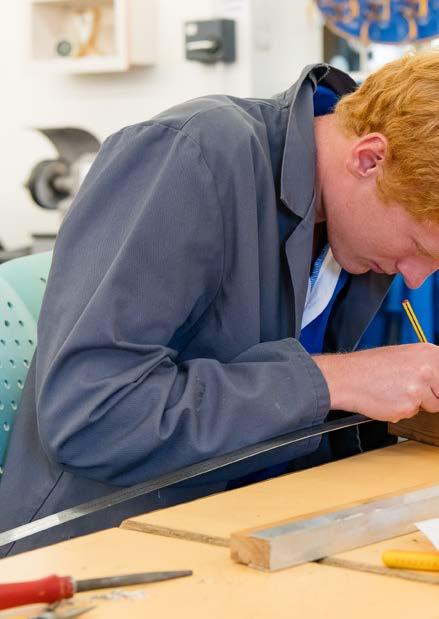
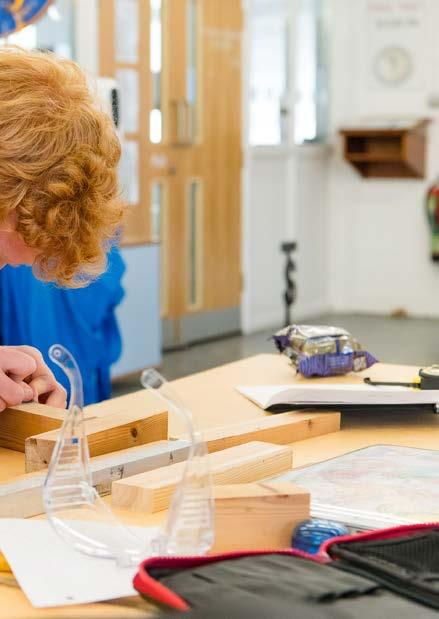
What can studying Design and Technology lead to at university and beyond?
Those who opt for Design and Technology at A-level can study a variety of design and engineering courses at university. The A-level is excellent preparation for boys who are serious about developing professional careers in engineering or design, especially when combined with STEM subjects.
Usually students opting for Design and Technology follow two paths: an engineering route alongside Mathematics and Science subjects, or a product design route alongside Humanities and other creative subjects.
Most boys go on to study at Oxbridge, Russell Group universities or prestigious Art and Design colleges. Over the years many boys have gone on to take a MSc or PhD and then worked for major companies around the world in various design and engineering disciplines.
Course (and Board): A-level (AQA 7136)
What is the subject about at Sixth Form level?
Many people think Economics is all about ‘money’ – it isn’t. The study of money is a relatively minor issue in Economics. So what is it about?
The starting point of Economics is the observation that resources – natural resources, labour and capital – are limited, whereas human needs and wants are unlimited. There must, therefore, be some mechanism for deciding who gets what. Various systems are possible, from the medieval ‘robber baron’ societies, where those who are strongest simply take the most, to utopian communist societies where all resources are owned in common and members are provided for according to their needs.
In our society, the market mechanism has developed, whereby goods and services are allocated to those who are able to pay for them. This has resulted in an astonishing increase in living standards over the past century and a half, as it incentivises firms and producers to innovate, invest and respond to consumers’ wants and needs. But it has also resulted in inequality, pollution and the unsustainable extraction of natural resources.
Economics is about how a society decides to divide up and use its scarce resources, and who gets what and why. It provides students with the tools to critically evaluate our society and economic system.
There is a strong emphasis on the policy measures to improve outcomes – after all, if our economic system is unsatisfactory (and
there’s a strong argument that it is, with its malfunctioning banking system, rising inequality, periodic recessions, and increasing pollution and environmental damage), what should be done about it?
Why study it and what skills does it help develop?
The course teaches a coherent and balanced body of economic theory which enables boys to understand how prices change in response to changing demand and supply conditions, and how changes in prices impact consumption, employment and other economic variables. The theory cannot be separated from application to the real world, however, so it gives boys a thorough grounding in “how the world works”.
It teaches boys how to think logically, how to analyse data and use it to support arguments, how to identify trends and draw conclusions from them, and how to present arguments coherently and effectively. Students enjoy being able to apply their knowledge and understanding to issues which arise daily in the news such as the Covid-19 pandemic, the growing power and influence of China, and the debate about UK government spending cuts and tax policy.
What level of prior knowledge and skills is required?
Very little prior knowledge is required. Economics at Tonbridge is an excellent subject choice for any boy with an interest in the world around him, who enjoys problemsolving, and who is able to bring an openminded, imaginative approach to his studies.
The work is very varied, and includes
problem-solving exercises, data analysis, case studies, essay-writing and multiple choice questions. The ability to write extended pieces of critical analysis with a logical structure is important. Ultimately it is a ‘social science’, and that means it is a subject driven by data about human behaviour, which is usually statistical in nature.
Candidates need to be comfortable evaluating numerical data, although the mathematics involved in A-level Economics is no harder than GCSE.
What type of assessment is used?
There is no coursework. The course is assessed using externally-set examinations. The examinations will contain elements of:
• Multiple-choice questions
• Data-response questions (written answers on case study material)
• Written essays
With what other subjects does Economics combine well?
Economics can be combined with practically any other group of subjects and is often useful in demonstrating that a science specialist can write essays, and that an arts specialist can handle numerical data.
The subject tends to attract two ‘types’ of Sixth Form student: the Humanities specialist combining it with History, Geography or Politics, attracted to the challenge of applying economic principles to contemporary or historical issues; and the mathematician/ scientist combining it with Maths and Science subjects, attracted to the more theoretical features of the course with its opportunities
for application of statistical techniques.
If a candidate is contemplating pursuing Economics at university level, then Mathematics is a required A-level for many (though not all) universities.
Combining Business Studies with Economics is absolutely fine as part of a four subject combination. If you drop to three subjects, however, and wish to apply for a highly competitive course at a selective university, then you may be asked for a slightly higher offer if two of your three subjects are Economics and Business Studies: such universities prefer to see two contrasting subjects in addition to these two.
If you are uncertain about this, seek further advice from Mrs Rogers (Head of Higher Education and Careers).
What do boys currently taking Economics say about it?
‘It’s an interesting way of studying real world political problems, such as rising knife crime or extreme poverty.’
‘There are lots of opportunities to research and present your own ideas –good preparation for university life.’
‘It’s a subject that helps you keep abreast of current affairs.’
‘Learning about how markets work has helped me to understand so much about why society is the way it is.’

What can studying Economics lead to at university and beyond?
Economics is highly regarded by employers and universities. While it is rarely a required course, it provides a useful broadening of skills and perspective for many other courses.
It demonstrates some numerical ability in an Arts student, and some literary ability in a Science student. It also demonstrates the ability to evaluate and apply evidence and theory to practical problems, and as such is a valuable course to have followed.
Economics graduates can be found in all fields, but business, government and finance are the main destinations.
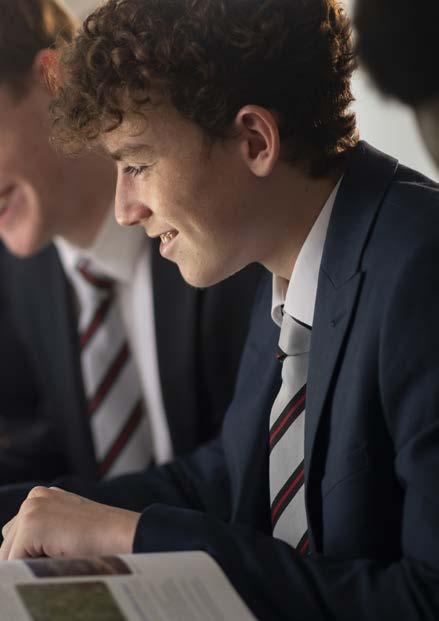
Course (and Board): A-level (OCR H472)
What is the subject about at Sixth Form level?
English in the Sixth Form reconnects boys with the enjoyment and fascination of reading for pleasure while exploring new modes of analysis that look forward to university-style teaching. Boys develop an advanced acuity of mind, sophisticated aptitude with language, and formidable critical judgement while encountering great literary texts. Doing so, they acquire confidence in navigating some of the most powerful tools available to the human mind: imagination, storytelling, persuasion, interpretation, evidence-based logical argumentation, and the crucial ability to recognise aspects of themselves in the experiences of another.
One week, boys might study the contemporary stage-play Jerusalem, winner of awards in the West End and on Broadway. The following week, they might engage with Hamlet, one of the most powerful pieces of artistic and philosophical expression ever conceived.
They may read Milton’s grand mythical poetry alongside experimental verse by E.E.Cummings, encounter Gothic novels like Frankenstein and Dracula followed by Ishiguro’s science fiction, traverse timebending texts like Stoppard’s Arcadia and McEwan’s Atonement, face the ravages of war in modern adaptations of Homer and in Adichie’s Half of a Yellow Sun, and much
more. The study of English stretches, explores and challenges in ways few other subjects can.
What level of prior knowledge and skills is required?
The analytical writing skills developed in English GCSE Literature form the basis for Sixth Form study. The writer’s words are analysed in closer detail and arguments are developed in greater depth and complexity, but the essential skills of independent thought and awareness of ambiguity and interpretation remain the same.
Understanding literature in its historical, cultural, aesthetic, literary, and intellectual contexts becomes an added emphasis.
What skills does studying the subject develop?
Rapidly changing technology and globalisation create an ever-shifting world. The nuances of analytical thought and creativity of mind developed in studying literary texts are more highly prized by universities and employers than ever before.
In the world of business, for example, success is increasingly guaranteed by the finer skills of emotional acumen, evidence-based persuasion, and the ability to understand the complex perspectives of clients. English classes develop these types of intelligence excellently.

Many Sixth Form texts are drama, so trips to the theatre are manifold, both for syllabusrelated and extension studies. Varying from year to year, other trips might include visiting literary sites and retreats focused on creative writing.
What type of assessment is used?
Assessment is largely done through analytical essays, though discussion in class, auxiliary research, and note-taking are key areas for developing ideas.
Wider reading beyond the course materials themselves is encouraged, to develop deeper, more detailed, more sophisticated responses to texts and authors. There are currently two coursework essays totalling 3,000 words overall. Standard essays throughout the course are closer to 1,000 words.
With what other subjects does it combine well?
English combines extremely well with all the humanities subjects. It is also popular with scientists wishing to retain a literary or essay-writing element to their studies.
Typically, English will be considered alongside History, Languages, the Social Sciences, and
Classics, or as a single humanities field studied alongside Maths and any of the Sciences.
What can studying English lead to at university and beyond?
English is supported by university admissions tutors as preparation for any course, including scientific study. English is particularly beneficial as preparation for a degree in any of the humanities, which require advanced abilities in interpretation, analysis, reasoning and writing.
Every year significant numbers of Tonbridgians gain places to read English at top universities, including Oxford, Cambridge, and in the USA. English prepares students for careers in a wide range of fields, as it develops analytical thought, argument, insight, and empathy in abundance. English graduates can be found plentifully in law, finance, government, journalism, media, academia, politics, entrepreneurship, consulting, information science and more.
Course (and Board): A-level (CIE 9696)
What is the subject about at Sixth Form level?
Geography is the only academic discipline to pursue an understanding of the interaction between humans and the physical environment and, as such, the scope of the subject is wide. On the one hand, for example, geographers explore the territory of the astrophysicist, analysing the influence of cycles in the orbit of the earth on climatic change while, on the other, they might trespass on the territory of the economist and the politician, analysing patterns of inner city urban deprivation.
In the Lower Sixth, one half of the lessons focus on physical processes affecting the earth (including Climatology, hydrology and tectonic and landscape processes) while the other half look at the human environments of cities, rural areas, population and migration. In the Upper Sixth the focus is more issue-based than topic-based, and boys learn to construct complex arguments relating to how society might cope with hazards, for example, or might solve global economic inequalities.
The IGCSE is a good preparation for the A-level course, but Geography can potentially be studied by a candidate who has not taken the GCSE if they are comfortable writing extended prose and are competent scientists /mathematicians.
Geography is fundamentally an ‘interest subject’; the world around us is fascinating
and no other subject offers the opportunity to study and come to understand such a wide range of issues.
So many of the crucial challenges facing society today, such as resource depletion, population explosion, urban sprawl, migration, racism, global warming, deforestation and hazard mitigation can only be understood fully through the ‘wide angle lens’ of a geographical education. Furthermore, boys are challenged to consider their personal and moral role in the world they study, and debate with their peers. This diversity is cited by the boys as one of the reasons they enjoy studying it.
During their A-level, all boys visit Tower Hamlets in the East End of London to see first-hand the causes of urban deprivation and segregation, and the subsequent regeneration and social integration. We also visit Camber Sands to look at coastal processes.
The study of Geography develops a wide range of very useful and marketable skills. Geographers develop their literacy (through writing essays and extended prose) and numeracy (through carrying out statistical analysis) and acquire a range of practical data collection and data manipulation skills both in the outdoors and through using computers (including GIS systems, which are becoming a major component of some university courses and many work environments).
For these reasons, Geography graduates in the UK have previously topped the list for highest post-university employment rates of students of any major subject, including vocational courses.
What type of assessment is used?
This International A-level examination is still conceived to be in the format of the older AS and A2 exams, where the two AS papers are intended to be less challenging, and the two A2 papers are significantly more challenging. We are now sitting the AS papers early in the Upper Sixth Year around the October half term, thus leaving only two A2 papers for the summer term of the Upper Sixth.
The AS contributes 50% of the total marks (and is included in calculating the A* grade). At AS level, it is assessed in a very similar way to the IGCSE, with short answer questions sometimes relating to graphs or photos.
There is one piece of more extended prose in each of the Physical and Human Geography exam papers, but this is explanatory in nature rather than discursive.
At A2, students answer questions on two topics in the Physical Geography exam, and two topics in the Human Geography exam. Each topic has a compulsory 10-mark question, often based on stimulus material such as a graph, and then a choice of more open-ended (30 minute) discursive essays, of which a student picks one.
With what other subjects does it combine well?
Geography is almost totally unique in that it combines well with almost any conceivable combination of other subjects. Recent successful Oxbridge Geography applicants from Tonbridge have had other A-levels of Maths, Chemistry, Biology; English, Business Studies, DT; Maths, Economics and Politics, for example.
However, very typically Geography provides an essay-based complement to those doing science/mathematics based subjects, or a scientific data analysis addition for those studying the Arts and languages. The subjects with the most direct overlap with Geography are possibly Economics and Biology.
What can studying Geography lead to at university and beyond?
Geography is a very popular degree course nationally, and particularly with Tonbridgians. There is a wide range of Environmental Science courses (notably Earth Sciences) and Social Science courses (such as Land Economy) for which Geography is one of the major A-levels that undergraduates have previously studied.
However, the all-rounder nature of most Geography graduates makes them highly employable in a plethora of areas.
Course (and Board): A-level (AQA 7042)
What is the subject about at Sixth Form level?
History is the study of the past: what happened, why, with what consequences, and what people thought and continue to think about it. In the Sixth Form, the study of History becomes both broader in chronological range and deeper in terms of the complexity of the subject matter compared to GCSE. It is at this point that many boys are, for the first time, able to challenge convincingly the arguments and viewpoints that they come across in their studies.
In the Sixth Form, we offer an OCR A-level course with considerable chronological and geographical range. Students study the British Empire from 1857-1965, examining topics like why the Empire grew so rapidly in the late 19th and early 20th century, how the Empire affected life in Britain and who the key opponents of colonial rule were. Alongside this, students examine the Crusades 1095-1192, exploring the motivations, the struggle to survive and the impact of the Crusades, and Britain 1930-1997, which explores the key currents that have shaped British history and politics in the last 100 years. Students complete relevant coursework in the Upper Sixth on a historical topic of their choosing.
Why study it and what skills does it help develop?
There are many reasons for studying History and some of them are in tension with one another. This reflects the fact that History is about finding the balance between the
similarities and the profound differences between the present and the past.
As a department, we aim to cultivate a curiosity in the past for its own sake and this is a sufficient reason for studying it. History also helps us to understand the present and can illuminate contemporary forms of identity.
At the same time, History provides a means to escape from the tyranny of the present and its unquestioned assumptions. By seeing how societies at other times have existed or been profoundly changed, we can begin to appreciate the possibility and plausibility of change in the present.
History in the Sixth Form broadens historical knowledge and understanding. It develops skills of research and enquiry, the analysis, interpretation and evaluation of evidence and arguments, and the persuasive, structured presentation of a case through extended writing. History is, therefore, worth studying for its intellectual stimulation and challenges.
In terms of historical content, we consciously avoid repetition of the GCSE syllabus in the Sixth Form and therefore do not expect any prior knowledge of the particular eras and subjects studied. We are looking for boys who enjoy independent reading, can retain factual information, are able to analyse problems and write persuasive arguments, with focus and substance. These skills are developed by studying History at GCSE level, but this is not
an absolute requirement for studying the subject in the Sixth Form.
What type of assessment is used?
Whereas at GCSE level, some exam questions are answered in less than a page of writing, in the Sixth Form nearly all assessment is through extended writing or essays. Some of these are based purely on the knowledge and skills that the student brings into the exam hall, others on analysing contemporary historical evidence or short extracts from historians in combination with a student’s knowledge. There is also a coursework component involving independent research on a topic of the candidate’s own choosing (this may build on topics already studied, or explore entirely new areas of the subject).
With what subjects does History combine well?
There is almost no subject available at Sixth Form level which does not in principle combine well with History. Practically every university course and most employers, too, require candidates who can communicate their ideas clearly, persuasively and effectively. A number of students every year choose History together with scientific or mathematically-based A Levels due to its academic rigour.
What activities operate outside the classroom?
The senior History Society is run by boys in collaboration with members of the department. Boys in the Lower Sixth will have the option to write for and, for some, to edit the History Department magazine (‘The Boar’). Students are encouraged to enter
external essay competitions, and a range of lectures and trips are put on by the department throughout the year.
What do boys currently taking History say about it?
‘History is the most useful Humanities subject as it is the most highly regarded by the best university departments - I am so pleased that I chose it.’
‘Anyone who wants to understand why the world is the way it is should study History.’
‘All the teachers really want you to succeed.’
What can studying History lead to at university and beyond?
History is highly regarded by university admissions tutors and is often described as a ‘facilitator’ subject. A number of our students every year go on to study History or related courses, but boys also rightly see History as a subject which strengthens applications for Law, Medicine and PPE, amongst others.
Studying History at university can lead to a very broad range of careers because of its development of a widely applicable skill set, namely the ability not only to analyse and interpret evidence but also to present those findings in a compelling fashion.
This makes it good preparation for careers in the city, business, management, law, journalism and the civil service, as well as politics and education. Where appropriate, students are taken to one-day conferences relevant to their courses to hear the perspectives of leading academics.
Mathematics Course (and Board): A-level (OCR B (MEI) H640)
Further Mathematics Course (and Board): A-level (OCR B (MEI) H645)
AS level: (OCR B (MEI) H630)
This section applies just to the Mathematics A-level chosen in a single block. Those contemplating studying Further Mathematics are advised to read this section first and then the one on Further Mathematics which follows this, as the similar material is not repeated.
What is the subject about at Sixth Form level?
Maths continually builds on previous foundations. Maths at A-level builds on those ideas and techniques studied at IGCSE. In the Core (or Pure) Maths, the numerical, geometric and especially the algebraic strands are pushed further, including the study of arguably the greatest ever mathematical technique of differential and integral calculus.
The work here has its own intrinsic beauty and, wherever possible, examples of the use of these techniques are given.
In Mechanics, the ideas of force and motion are studied and some simple models for these are considered within the scope of the Pure Maths techniques; there is overlap here with Physics, and with Design and Technology.
In Statistics, probability and ways of representing data are studied, along with models for and methods of analysing data, again within the scope of the Pure Maths techniques; these ideas are useful in many other subjects, such as Economics, Biology and Geography.
What level of prior knowledge and skills is required?
Maths is a very useful, but difficult, A-level. Statistical results from past pupils indicate that those who achieve a 9 at IGCSE are very likely to achieve at least an A grade at A-level. Those in the top half of the Grade 8 are likely to achieve at least a B grade at A-level. By contrast those who only achieve a 7 at IGCSE rarely achieve above a C grade, although it is always realised that there may be a few who fit into this category and have very good reasons for doing Maths A-level. It is especially important to be good at algebra. As with all subjects, success is heavily affected by the effort applied, and an enjoyment of the subject clearly helps here.
What skills does studying the subject develop?
Maths combines aspects of science, logic, abstract reasoning, creativity and the precise use of language, and this combination of skills is valuable for many areas. Studying Maths instils the ability to calculate confidently and to work with scientific ideas. It also gives training in analytical methods and logical thinking. It is highly valued by employers in a variety of fields.
What type of assessment is used?
Tonbridge has chosen to do the OCR (B) A-level under the new linear scheme which started in September 2017. There will be three papers all taken at the end of the Upper Sixth. Paper 1 is two hours and consists of questions on both Pure Maths and Mechanics. Paper 2 is two hours and consists of questions on both Pure Maths and Statistics. Paper 3 is two hours (but with a slightly lower weighting) and consists of questions on Pure Maths and a Comprehension based on the Pure Maths techniques.
Can one study extra Maths beyond single Maths A-level?
It may be possible to study some extra Maths in the Upper Sixth. The most common request is from those considering Engineering, who want to study some additional mechanics while at school to prepare them better for university. However, we have also had requests for more Maths in other areas. The provision of this depends on demand from boys and availability of staff to provide help, so cannot be guaranteed in advance.
It also requires a great deal of determination and an ability to work independently. Under the new scheme there will be no credit for this, although it will still provide the same head start for university courses as previously.
What can studying Mathematics or Further Mathematics lead to at university and beyond?
A few boys studying Maths A-level go on to study Maths or a joint honours course involving Maths at university, but more will use their Maths learned at A-level to support a university course majoring in a different area. Most engineering and physical science courses will require Maths and most biological science, social science and design courses will consider Maths A-level an advantage. In all these cases Maths will be studied further at university, but focusing on those areas appropriate for that subject. The skills learnt in Maths A-level will be very useful when applying for jobs in a wide variety of areas.

Much of the material that is included under Mathematics is also applicable to Further Mathematics, so it is suggested that the Mathematics section is read first.
In this section, some of the differences between Mathematics and Further Mathematics are highlighted. Further Maths needs to be chosen in two blocks. Boys choosing the latter will end up with two A-levels, one in Maths and one in Further Maths.
What level of prior knowledge and skills are required?
Maths is a difficult A-level and Further Maths even more so. The more material beyond the IGCSE one is familiar with, the easier the start on Further Maths will be. Further Maths requires some mathematical ability but it requires even more hard work than Maths, coupled with a willingness to do more work independently.
What type of assessment is used?
Further Maths will also be assessed under the OCR (B) MEI scheme. These will include material from Pure, Mechanics and Statistics that goes beyond the syllabus for single Maths.
There will be at least three papers.
• A pure paper of 2 hours and 40 minutes is worth 50% of the total.
• A major applied paper, which can be either Statistics or Mechanics of 2 hours and 15 minutes, is worth 33% of the total.
• A minor paper consisting of the other branch of Applied Maths, of 1 hour and 15 minutes, is worth 17% of the total.
It is likely the higher sets will cover sufficient material so that they can be given a choice. It may be possible for the lower sets to opt in advance which half to take further but that will depend on numbers.
In addition, the top set may do an extra Pure Maths minor, which could count instead of the applied minor.
With what other subjects does it combine well?
Maths fits well with a range of other subjects. Clearly there is a strong fit with other scientific subjects but social scientists find that Maths assists with those subjects too. Those majoring in Arts often choose Maths as a useful, contrasting subject.
Those boys studying Further Maths have provided a very high percentage of successful Oxbridge places in recent years.
French Course (and Board): A-level (Pearson 9FR0)
German: A-level (Pearson 9GN0)
Mandarin: Pre-U (CIE 9778A)
Spanish: A-level (Pearson 9SP0)
What is the subject about at Sixth Form level?
We believe that learning a foreign language has never been more important, for the diverse and valuable skill set that it develops, the cultural awareness and sensitivity that it promotes, and the sheer enjoyment that it offers. Those who are inquisitive about the world around them, critical, creative, open-minded and in search of a rigorous and stimulating intellectual challenge, should look no further.
Why study it? What skills does it help develop?
Studying a modern language is a highly interesting and hugely rewarding experience. Sixth Form modern language study continues the process of linguistic development through the study of themes firmly rooted in the culture and society of the country or countries where your language is spoken. How can we account for the popularity of the far right in modern France? What does verlan – a form of French slang used by young people to mark their adherence to, or exclusion from, particular social groups – say about identity? What was life like in East Germany? Why, eighty years after the end of the Spanish Civil War, is the country still divided? Why is Mao still regarded as a hero rather than a villain in
today’s China? Why is Xi, himself a victim of Mao’s brutal regime, now trying so hard to be the new “great leader” of 21st-century China?
Boys will come to converse naturally and idiomatically on unprepared topics, to write analytically and creatively on literature and film, and use authentic cultural artefacts such as magazines, newspapers and documentaries to develop their understanding of, and form opinions on, key debates and issues.
What level of prior knowledge and skills is required?
The study of Modern Languages post-IGCSE is very much within the ability range of most who achieve an 8 or above at IGCSE. If you are interested in studying a language at A-level but are predicted to achieve less than an 8 at IGCSE, please come and talk to us: we are very happy to advise on a case-by-case basis.
What type of assessment is used?
There is no coursework element at A-level, but in French, German and Spanish an Independent Research Project – on a contemporary or historical theme related to the target language and culture – is a major component of the oral examination. Receptive skills (listening and reading) are assessed through short answer questions based on authentic stimulus material.
Boys will be required to translate from and into the target language, and will write analytical essays on the set text and film studied.
By the end of the course, boys will be confident, capable and creative communicators both orally and on paper, with the ability to understand, respond and react to language as it is used by native speakers.
With what other subjects does a modern language combine well?
Boys have in recent years successfully combined a language with Sciences and Mathematics, as well as with more traditionally compatible subjects such as English, History, Economics or another language. Certainly, there are distinctly logical and analytical elements to the course, as well as creative and interpretative opportunities, which gives this subject a unique feel.
The reality is that languages are a ‘facilitating subject’ and so enhance any portfolio. Many medicine courses, for example, are particularly keen on the study of a modern language post-IGCSE as it shows an ability to communicate, understand and be sympathetic to other viewpoints and perspectives.
The same is true of lawyers looking to sway a court room, engineers embarking on projects
abroad, or humanitarian workers as they seek to break down cultural or social barriers.
Many university courses and careers actively encourage knowledge of a foreign language and there are a growing number of opportunities to spend time abroad on a placement as part of your studies in another subject.
What happens beyond the classroom?
There are few things more rewarding for a linguist than spending time immersed in the target language and culture – this is where genuine and authentic progress is made as the language becomes alive. There are a number of trips organised by the Modern Languages Department, and we can also advise on and help to arrange individual study or work placements.
Visits to the theatre or to art galleries and exhibitions are also frequently arranged, as are film nights here at school. The student-led Modern Languages Society invites and hosts guest speakers and organises events, including seminars, reading groups and careers evenings.
There is a well-established extension programme in place to stretch and challenge our most able boys, with both faculty-wide and language-specific seminars.
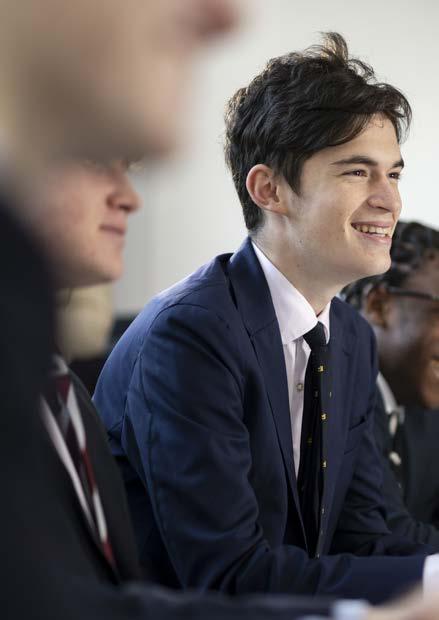
What can studying Modern Languages lead to at university and beyond?
The answer is, unsurprisingly, almost anything! For some years now the second or third most popular choice of degree course for Tonbridge leavers has been languages, or a language combined with another subject.
The ability to understand other cultures and different ways of thinking, combined with the ability to communicate accurately, showing precision and rigorous attention to detail, are attributes that are highly prized by employers both here in the UK and abroad. As opportunities for employment open up in Europe and further afield, there has never been a better time to take advantage of the enjoyment and practical skills that the study of foreign languages can offer.
Graduates in modern languages enjoy access to a wide range of jobs in the media, the civil service, the education sector, the business sector and the law, amongst other areas; and their salaries tend to reflect their highly sought-after skills.

Course (and Board): A-level (OCR H543)
Playing the notes is only half the story – how can one perform without understanding?
In a nutshell, the study of Music in the Sixth Form offers the opportunity to develop understanding. We cover issues of historical context, compare interpretations (both live and recorded), experience performing and composition (both original and “in the style of”) and develop listening skills. There are a number of set works from different periods which allow boys to engage with stylistic features in detail; this, in turn, develops skills which are transferable to other pieces and genres.
Boys who have studied Music in the Sixth Form bring greater maturity and interpretative awareness to their performance, since they have thought about the “how” and “why” questions.
Most boys who study at this level will have taken GCSE Music as the core skills required form the basis of these two years. However, in consultation with Music staff, it may be that a boy could take up the subject in the Sixth Form, particularly if he is an accomplished performer and has taken at least Grade 5 Theory.
Trips are regularly arranged for boys to go to live performances in London, particularly to hear set works or associated repertoire: these concerts enable boys to hear first class musicians, often at significantly discounted prices.
What type of assessment is used?
The main elements – Performing, Composing, Listening and Historical topics –will be assessed in a variety of ways. There is a significant component of coursework, especially in Composition and Performance (both as a soloist and in an ensemble) which is assessed in the Lent Term. In that respect, much of the Music course is completed ahead of the main exam season: this can be particularly advantageous for some boys. Aural skills and essay-writing are tested in the final written paper, and the ability to express clear and well-structured arguments is certainly important.
With what other subjects does it combine well?
It is widely accepted that Music combines well with both Arts and Science subjects, as there is considerable crossover with both.
The various disciplines outlined above can be complementary to other subject choices (such as essay-writing subjects) or work equally well as a contrast to them.
In certain cases, in consultation with staff, it is possible to combine Music with other half-block subjects (such as Double Maths), as much of the work for Music can take place outside the regular timetable.
There is evidence to suggest that studying Music in the Sixth Form is viewed very positively by universities as demonstrating a breadth of interest while still maintaining rigorous academic credentials.
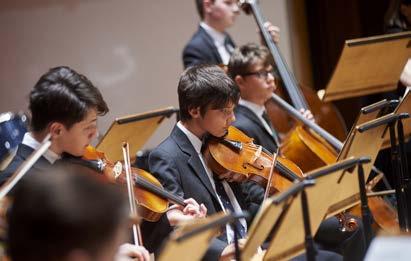
What do boys currently taking Music say about it?
‘Taking music in the Sixth Form was one of the best decisions I have made in my Tonbridge career – it helped me grow as a performer, historian, analyst and, more importantly, as a person. The cultural exposure granted by the Personal Investigation has enabled me to stretch myself to link social issues and historical events to music, and has definitely expanded my horizons.’
‘As well as enhancing a diverse set of skills, from performing and analysing to critique and historical study, studying music in the Sixth Form alongside the incredible set of staff in the department provides indispensable insight to some of the world’s greatest works of art.’
‘The best thing about music in the Sixth Form is that everything is relevant: every piece you listen to, every concert you play in, every random fact about music, can be used in the final exam.’
What can studying Music lead to at university and beyond?
Studying Music at Sixth Form level is clearly a prerequisite to take the subject on to Higher Education, but the breadth of skills developed as a Performer, Historian, Composer and Analyst in Music are all extremely well-regarded skills for any boy to develop.
Not only this, but an accomplished musician will also develop emotional and interpretative skills which are applicable to many other walks of life.
The subject also feeds successfully into the wider music industry, for example in Music Technology, Recording, Broadcasting and Journalism, and Music Management.
Course (and Board): A-level (Eduqas A420QS)
What is the subject about at Sixth Form level?
From the smallest quantum particle to the entire universe and everything in between, Physics is the analysis of nature, conducted in order to understand how the world and universe behave. The course studies how fundamental forces govern the world around us and how these forces shape our everyday life. Many new topics are introduced, while topics from IGCSE are developed further. Physics is both a practical subject and a way of thinking: skills developed throughout the course are transferable into almost any career and make one look at things in a slightly different way than before.
Why study it?
Physics is a subject for those who like understanding how things work, and are proficient mathematicians. With one of the best equipped departments in the country, lessons cover practical experiments, demonstrations, online courses, problemsolving and much more.
Boys are taught by two teachers each year (having exposure to four members of the Department across the Sixth Form) and have
access to an extensive set of Firefly resources to support their learning: an online suite of videos, question packs, extension material and explanatory animations have all been well received by boys taking the subject to date.
An extensive enrichment programme sees students have access to a multitude of super-curricular opportunities, including the opportunity to enter many international competitions.
Recent successes have included winning the Weizmann Safe-Cracking competition, getting multiple podium finishes in the Schools Aerospace Challenge and being the highestranked UK student team in the International Physics Brawl. Boys’ problem-solving skills are also developed considerably through the use of Isaac Physics, the British Physics Olympiad and problem-solving workshops. A six-week individual investigation on any topic of choice is a highlight of the course, and means students can explore their interests without examination pressure for an extended period.
All of this means that Tonbridge Physicists are in high demand when applying to
university. More than twenty boys a year go on to read Physics or Engineering at university, with double-figure successful applications to Oxford, Cambridge and Imperial. The rigour of the A-level course, combined with the exposure to extension and enrichment material, means our Physicists are well prepared for life at university and beyond.
Beyond university, for those with an ambition to be at the forefront of developing technologies, it is necessary to study Physics at school. For boys with ambitions in other areas such as business management or finance, the study of Physics is also important, as problem-solving and analytical skills are improved considerably. The development of such skills also means Physics demands respect from employers and university admissions officers alike. Perhaps the greatest skill a Physics student develops is a sense of wonder about how things work.
What level of prior knowledge and skills are required?
Sixth Form Physics builds on and enhances the knowledge and skills developed during the
IGCSE course and it is important that anyone contemplating this subject has a profound interest and understanding of the IGCSE course.
Mathematical ability is a prerequisite for the course, as there is considerable mathematical application in real-world contexts; the taking of Mathematics A-level is thoroughly recommended as both subjects complement each other well.
Those doing Further Mathematics will find considerable overlap with Physics and will be well equipped for top university applications.
What type of assessment is used?
Physics is typically tested by short answer questions, some of which require multi-stage calculations and ability to manipulate equations. Being able to recall definitions, analyse data and draw conclusions are vital skills. No essays are required but you do need to explain physics phenomena clearly. Your practical skills will be assessed throughout the course in a series of short experiments conducted in class; there is, however, no coursework.
What do boys currently taking Physics say about it?
‘I enjoyed the lessons and got involved with lots of the Physics enrichment programme; I have competed in a safe-cracking competition in Israel, and conducted experiments in a Gulfstream at Cranfield University. It doesn’t get much better than that…’
‘Physics has been an interesting balance between theoretical concepts, and their relevance to the everyday world. I feel I now have a far better understanding of many phenomena I previously took for granted.’
‘I am off to university to read Engineering. Physics has been at the heart of the preparation for this course, both via the theory learnt in lessons, and through the opportunities to work alongside Maths and DT in supercurricular competitions.’
‘A challenging but rewarding subject –with lots of Maths!’
What can studying Physics lead to at university and beyond?
The study of Physics at A-level leads very well into options at university. In addition to Physics, there are many joint honours including Physics & Philosophy, and sought-after Natural Sciences courses. Physics is also important for all Engineering disciplines: traditional disciplines such as Mechanical, Civil, Chemical and Electrical, as well as newer disciplines including Environmental or Bio-Engineering.
Physics also allows students to study Material Science, and it complements both Maths and Computer Science very well. While Physics is not required for medics or architects, its relevance to both degrees means it is a popular additional A-level choice for boys wanting to study either subject.
Boys wanting to study Physics, Engineering or Physical Natural Sciences at some of the most selective universities are often expected to study as much Maths as is offered at their school; i.e. to include Further Maths.
The Head of Physics can happily discuss this with boys wanting further details.

Course (and Board): A-level (Pearson 9PL0)
What is the subject about at Sixth Form level?
At a philosophical level, ‘politics’ is about the resolution of conflict whereas ‘government’ is a system by which such conflict is resolved at a local, national, or international level. Key questions that must be answered are: who makes the fundamental decisions about how a society is ordered; how do those people gain the power to make those decisions; who, or what, are the major influences on decision makers; and what limits are there to the power of decision makers?
We answer these questions with reference in particular to the political systems of the UK and the USA, looking at which bodies makes legislation in each of these countries and what influences them; how the government is elected in each system; what constraints there are on the power of the government; the role that political parties have in forming the government and the legislative body, and how the judiciary interprets and enforces laws, as well as potentially constrains the elected bodies. We also consider some of the ideologies underpinning political decisions, notably liberalism, conservatism and socialism.
Why study it?
The fascinating element of studying Politics is that it is, of course, happening all around us constantly. While the US Constitution hasn’t been amended for over 30 years, the UK Constitution is constantly evolving, with Scottish devolution and our relationship with the EU being particularly significant issues in recent years.
National elections to appoint a new government happen at least every five years
in the UK and every two years in the USA (in fact more often since the candidates themselves have to be elected!). The ideological dynamics within and between political parties is always fluid, as is the mood of the electorate.
What level of prior knowledge and skills is required?
Politics is only available in the Sixth Form at Tonbridge and, as such, no specific prior knowledge is either expected or required. Boys should be willing to undertake independent reading and research and be prepared to tackle extended writing tasks.
What skills does it help develop?
Whilst gaining an understanding of core issues through contemporary developments is one of the joys of the subject, this is not an A-level in current affairs.
The course goes behind the events and attempts to provide an understanding of the structure and framework within which the political world operates.
As such it is an academic discipline that is concerned with considering alternative approaches to an issue and providing persuasive analysis and evaluation that is supported by evidence. Core intellectual and academic skills of inquiry, rigour, crossreferencing and the precise, concise use of language within extended pieces of writing will be developed throughout the course.
What type of assessment is used?
There is no coursework element and exams take the form of short answers, sometimes referring to some stimulus material, in addition to more extended essays.
With what other subjects does Politics combine well?
The subjects most commonly studied in conjunction with Politics at Tonbridge are Economics and History. An appreciation of Economics can help to understand some of the constraints a government is placed under, and managing the economy is obviously one of the main roles of any government – and there is often some crossover between the subjects within university degree courses.
At A-level, a boy is certainly at no disadvantage from studying either of the subjects without the other.
In terms of methodology the subject probably has most in common with History, and there is no doubt that some understanding of political history can help with understanding some contemporary political practices and issues. However, studying A-level Politics without A-level History would not put a boy at any practical disadvantage.
In practice boys tend to combine Politics with other subjects across the board: it is often taken as part of a Humanities ‘portfolio’ but it also often attracts scientists who are looking to develop broader skills.
What activities operate outside the classroom?
A vibrant Social Science Society – ISOS – is run by enthusiastic boys and invites outside speakers on a regular basis. In addition the Frusta Fustra politics discussion group meets two or three times a term to debate topical issues.
Lower Sixth boys attend a conference in London, where they hear from high-profile
political speakers. Upper Sixth boys often attend a conference at the British Library, where they hear from ex-Congressmen and leading university academics. In recent years members of the Department have had opportunities to participate on trips to China and to Washington/New York.
What do boys currently taking Politics say about it?
‘The Politics Department offers not only a solid foundation for those who seek to pursue further study in this area, but also a unique perspective and critique of world affairs.’
‘Politics offers an opportunity for those who care about the society around them (which should be everyone!) a chance to apply their analytical mind to something bigger.’
What can studying Politics lead to at university and beyond?
The A-level course offers an excellent preparation for any boy who is considering studying a politics related degree at university including Philosophy, Politics and Economics (PPE) or Modern History and Politics at Oxford; or Human, Social and Political Sciences (HSPS) at Cambridge.
However, Politics is a highly regarded subject in its own right, recognised as fostering a valuable and widely applicable skill set which lends itself to a broad range of undergraduate pursuits and a wide range of careers.
Course (and Board): A-level (Pearson 9RS0)
What is the subject about at Sixth Form level?
To what extent is this booklet real? Are some things always wrong? Why is there evil in the world? Do humans have a right to life? If so, when does this right begin? Do animals have rights? Why was Jesus executed? Did Jesus have coherent aims and objectives? What is post modernism and what does it have to do with religion? Such questions, and many more, will be discussed over the course of the A-level in Religious Studies: Philosophy and Theology.
This A-level is an exciting and challenging option that takes a serious and critical look at theological, philosophical and ethical issues. It should appeal to boys who enjoy arguing, wrestling with ‘big questions’ and reflecting on issues that remain supremely relevant to the world today. Lessons are very much based on the seminar model and there is ample opportunity for debate and for boys to develop their own views.
GCSE Religious Studies, although obviously useful, is by no means an essential requirement and a number of boys come new to the subject each year with great success. All boys take three papers over the course of two years.
The Philosophy of Religion paper examines arguments for and against the existence of God (the design, cosmological, ontological and argument from religious experience). We
look at classic formulations of the arguments and the criticisms levelled at them over the last two hundred years.
The problem of evil is looked at in depth and scholars ranging from Augustine to David Hume are given serious consideration. Religious language, whether it is possible to use human language to speak meaningfully of God, and the challenge of the New Atheists (Dawkins and co) are also examined. Boys will grapple with modern scholarship and examine key passages of the great philosophers’ work.
The Ethics paper examines ethical theory –the tools for tackling practical ethics – and demands an understanding of the theories of ‘key’ thinkers such as Aristotle, Thomas Aquinas, Kant, Mill and Bentham. It then applies them to contemporary moral issues: war and peace, abortion and euthanasia, sexual ethics and environmental ethics. Each issue is unpicked carefully, and the underlying philosophical issues become the focus for debate.
The New Testament side of the course begins with an examination of the social and political world of first century Palestine and goes on to look at aspects of Jesus’ teaching – the Kingdom, parables, miracles and conflict. It also examines the presentation of Jesus’ last week in the gospels. It is certainly not ‘Bible study’: the focus is entirely academic.
The text will be subject to intense scrutiny as we piece together a picture of Jesus and the very different world of the gospel writers. In examining the New Testament we will engage with contemporary scholarship and use aspects of sociology, anthropology, literary theory, ancient history and archaeology to illuminate the text. There are set texts from contemporary scholars and John and Luke’s gospel.
By the end of the course we hope boys will have been enthused and stretched by the philosophical and theological issues that they have studied. Our aim is that boys will also have developed key study skills such as research and analysis, and will be able to weave clear, critical and succinct arguments orally and on paper.
What type of assessment is used?
The course is examined by three papers, all two hours each. There are three short response questions, which require an outline of an issue, a short argument in response to a statement and a summary of a set text. There is also an extended essay question.
With what other subjects does it combine well?
Religious Studies: Philosophy and Theology is most naturally complemented by other Humanities such as English, Classics and History, and boys studying this combination of subjects are often surprised by the fruitful
and interesting links that can be made. Many scientists have found taking Philosophy and Theology enriches their Sixth Form studies, especially the medical ethics components, and allows them to develop their essay writing and other critical skills.
What can studying Philosophy and Theology lead to at university and beyond?
A-level Religious Studies: Philosophy and Theology is highly regarded by universities and employers alike, as it requires the candidate to analyse, argue and to research independently.
A number of boys go on to study Theology or Philosophy-related courses at university (including PPE) and it is a well-regarded route for boys looking to study other subjects. Trinity College, Cambridge, for example, includes Religious Studies and related courses on its list as acceptable subjects for entry into all Humanities courses.
The ideal theologian is (or will become) versatile, able to assess texts and arguments from different perspectives and be logical in their thinking. This makes Philosophy and Theology an ideal subject for those considering Law as a profession, but it is also highly regarded by any career which values clear thought and articulate expression.


Course (and Board): A-level (Eduqas A690QS)
What is the subject about at Sixth Form level?
Theatre is arguably the world’s oldest and most political art form. This course is aimed at those who have a genuine interest in drama and the process by which theatre is made. It looks at the progression of taking a production from page to stage; the creation of original work through playwriting and practical devising as part of an ensemble; the roles of the director, actor and designer in that process; and the influence that various theatre practitioners throughout history have had on modern theatre practice.
An enthusiasm for acting is required, but there are also opportunities for exploring technical and design areas.
Why study it and what skills does it help develop?
Theatre Studies is a very demanding but enjoyable A-level. The course requires a high degree of creativity, practical involvement in the world of the theatre and a desire to explore the function of drama within society today. It also demands a sophisticated, committed level of group work and an appetite for intellectual enquiry.
The discipline will teach you essential and transferable real-life skills such as how to communicate effectively, collaborate, solve problems by thinking creatively, projectmanage, present, reflect and evaluate. These are skills that are required in almost all modern workplaces.
What level of prior knowledge and skills is required?
Ideally, those opting for this course will have taken GCSE Drama successfully. However, a commitment to theatre and a willingness to develop one’s self-confidence through a subject that has a strong practical emphasis are as important. The course is intellectually rigorous but also gives those with specific practical skills the opportunity to do well within a subject that necessarily involves a different, exciting approach to learning.
What type of assessment is used?
The majority of the course (AQA) is taught practically (60%), with assessments taking the form of performances of devised and scripted work. You can, of course, opt to focus on technical design instead of acting in these productions.
There are two coursework assignments that are firmly rooted in the practical work and a final written paper based on the exploration of two set texts and a live theatre review. The focus throughout the course is on the practical exploration of play texts as an actor, director or designer. Students will explore the text through diverse critical lenses, gaining a deeper understanding of its social, cultural, historical, and political significance within the literary canon.
With what other subjects does Theatre Studies combine well?
For many boys it provides a different way of working from their other subject choices and therefore sits happily alongside more scientific or essay-based subjects. Many Tonbridgians have gone on to practise Law, Medicine or gone into business armed with the skills that Theatre Studies has afforded them.
The creative nature of the course lends itself to other artistic and performance based subjects such as Art and Music. The literary aspects link well with English, and the investigation of socio-political ideas and concepts tie in happily with Religious Studies: Philosophy and Theology, History and Politics.
What activities operate outside the classroom?
Live theatre lies at the centre of this A-level. Boys are encouraged to see as much theatre as possible and have the benefit of quality performances in the school’s E.M.Forster Theatre, as well as a timetable of regular theatre trips to the West End, professional workshops and NT Live.
Involvement in school productions enables students to practise and hone their dramatic skills. Boys often form part of the Hoghead Theatre Company, which takes a production to the Edinburgh Fringe at the end of the Upper Sixth year.
What do boys currently taking Theatre Studies say about it?
‘The strong relationship with the teachers allowed us to progress and be comfortable asking for help.’
‘Theatre Studies is the most psychologically taxing A-level.’
‘My experience has been a journey, one that has been more rewarding than any other subject.’
‘I would recommend the course if you care for spiritual, social and intellectual improvement.’
‘Drama punctuates my day by getting me out of the habitual academic mind-set.’
‘I have learned to work in a group dynamic and I have learned to work with urgency.’
What can studying Theatre Studies lead to at university and beyond?
Theatre Studies is welcomed as an academic A-level by all universities, whether as the main interest or as a sign of breadth of study.
Some boys will go on to read Drama, but it also works well for those studying English, Law, Languages, Philosophy or any area of the media.

